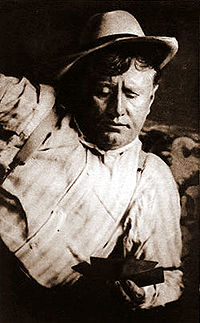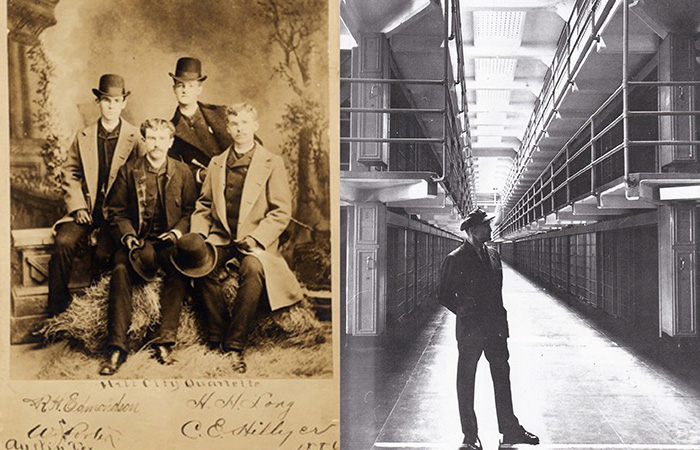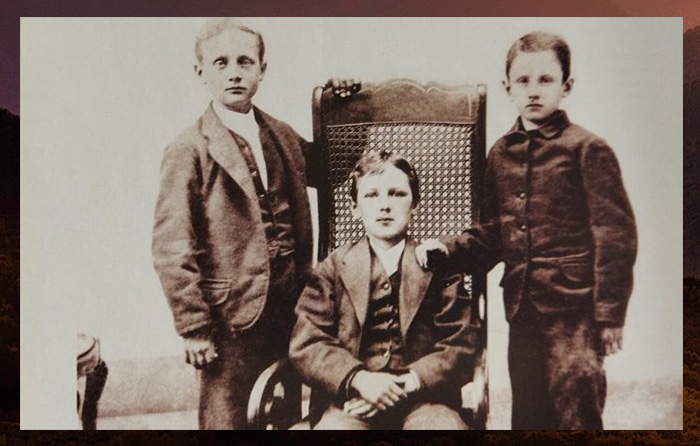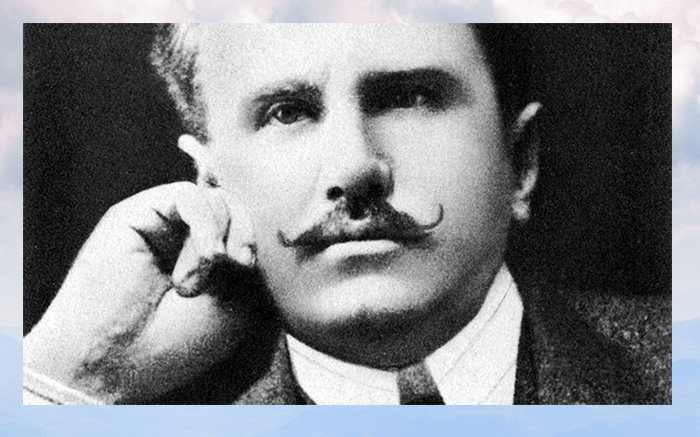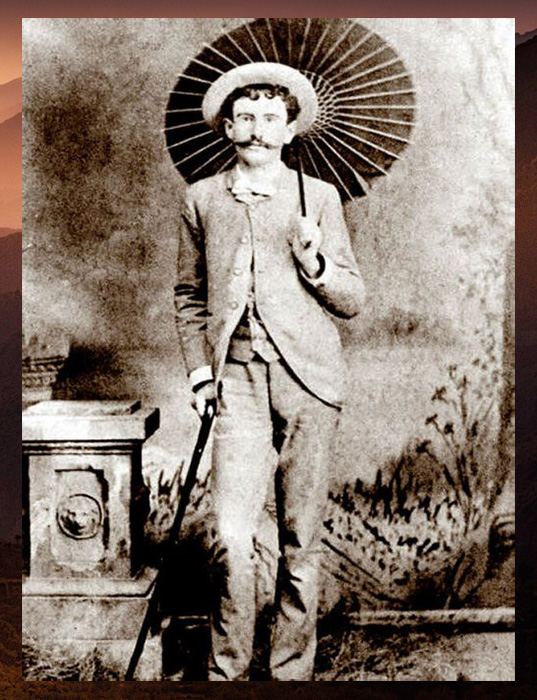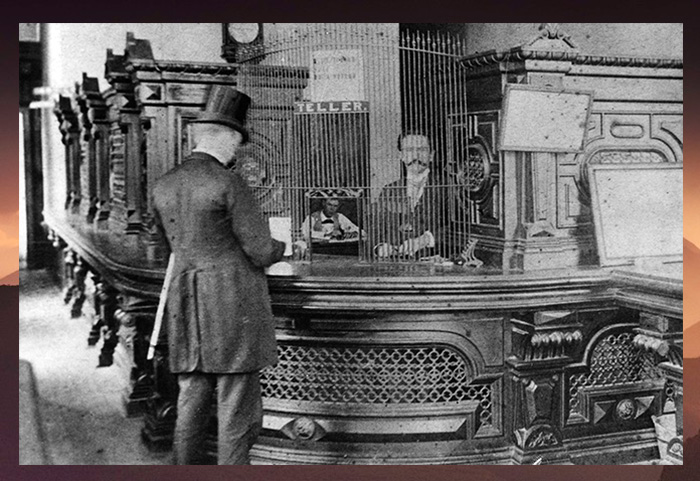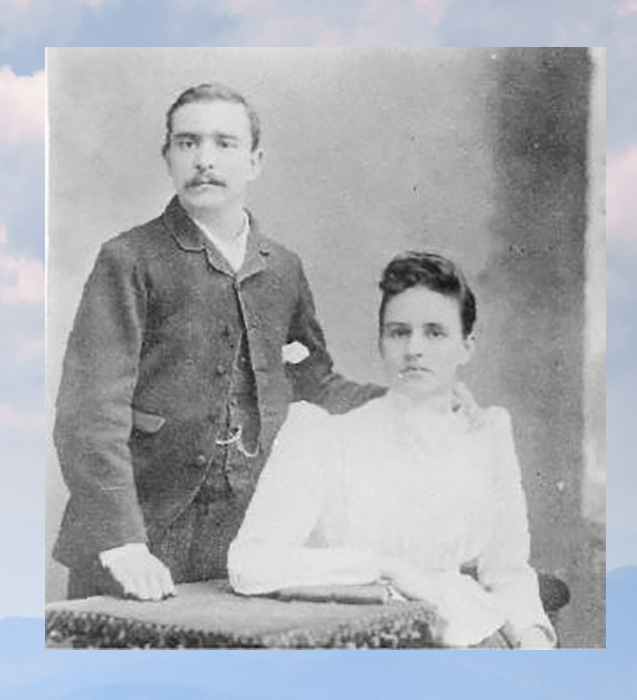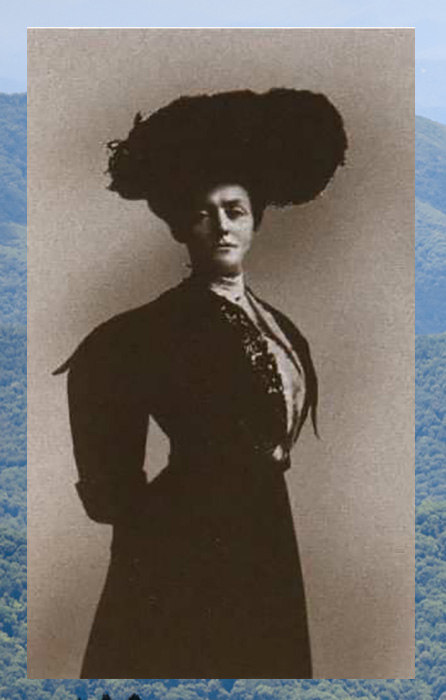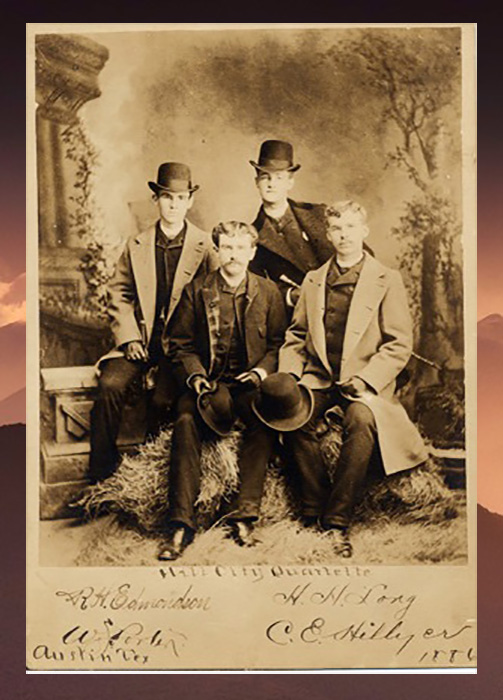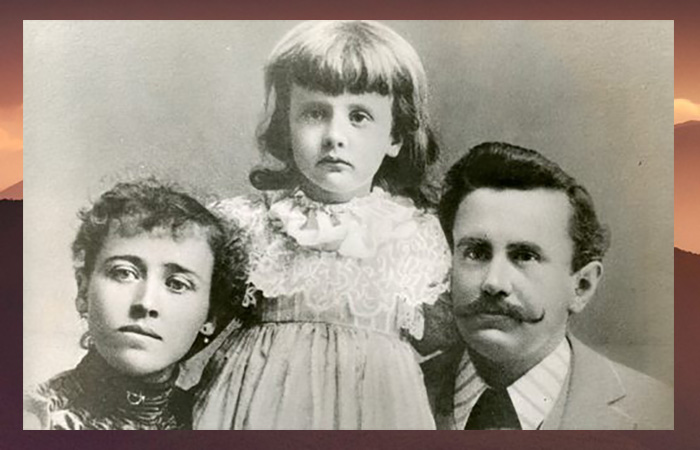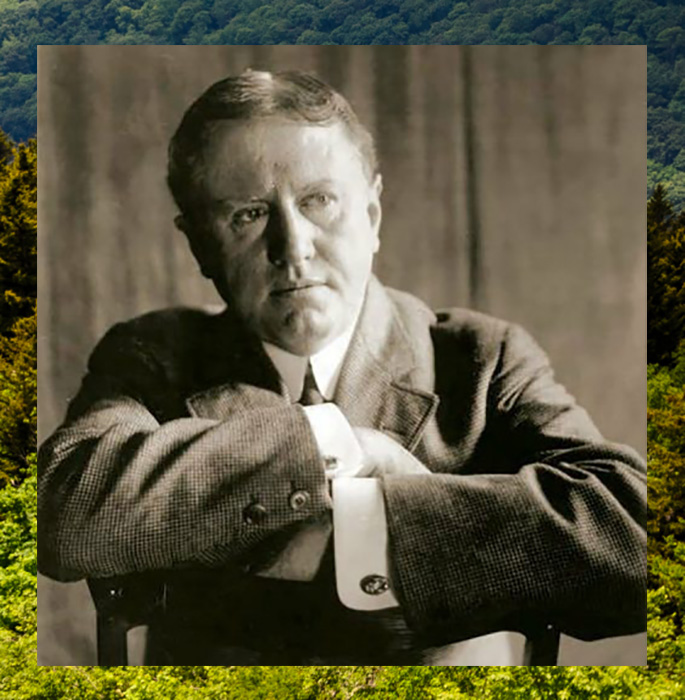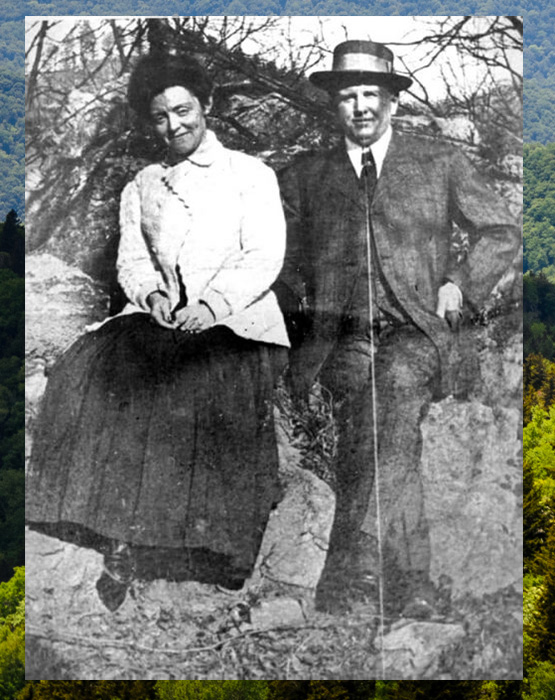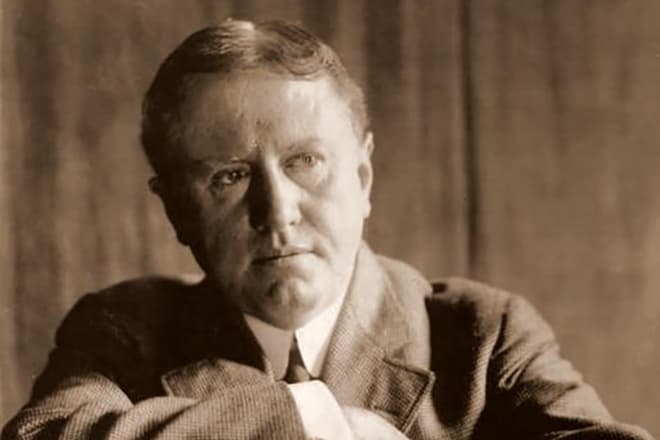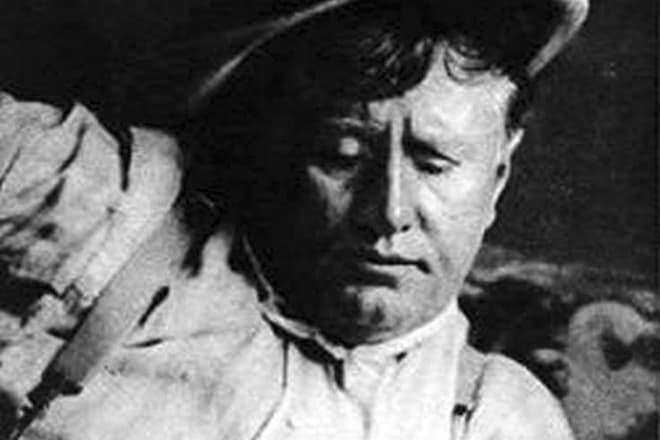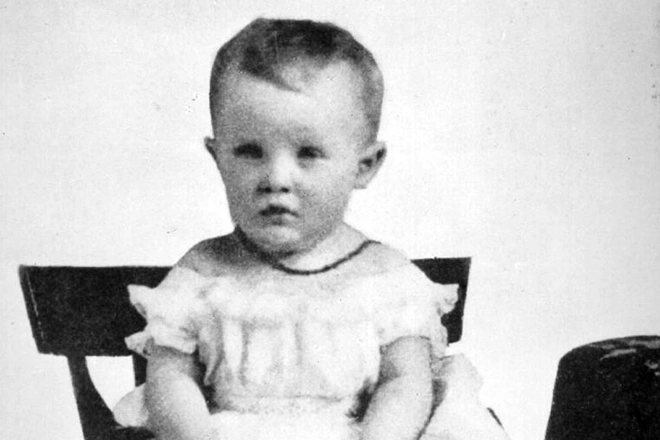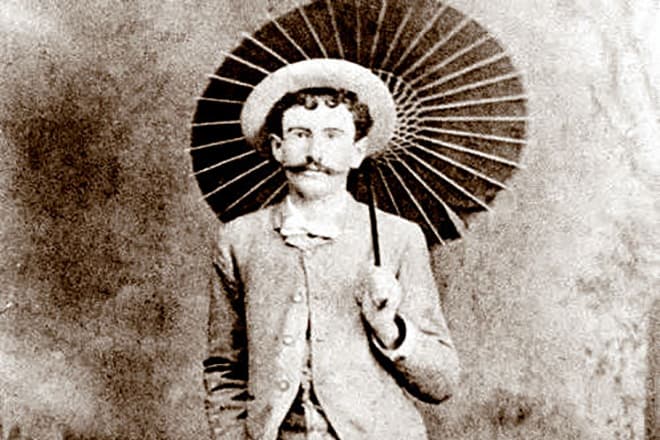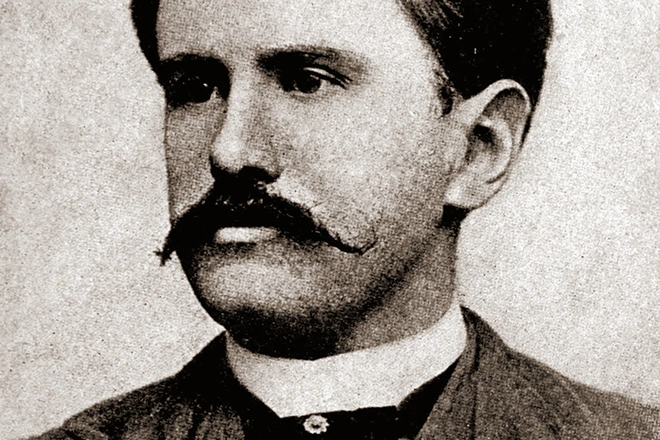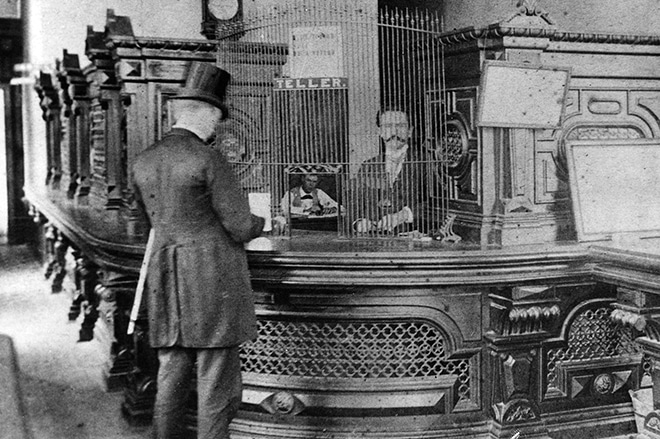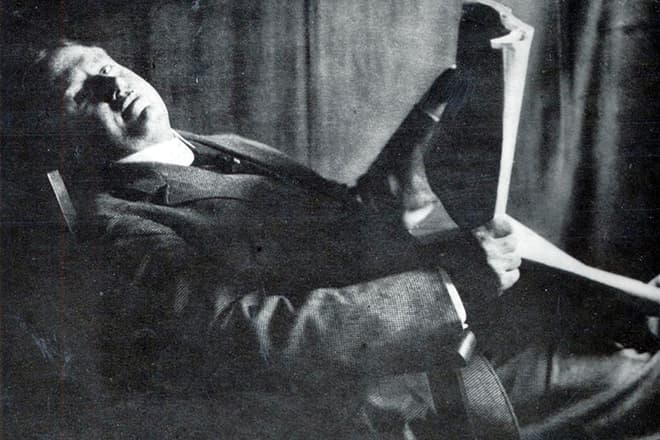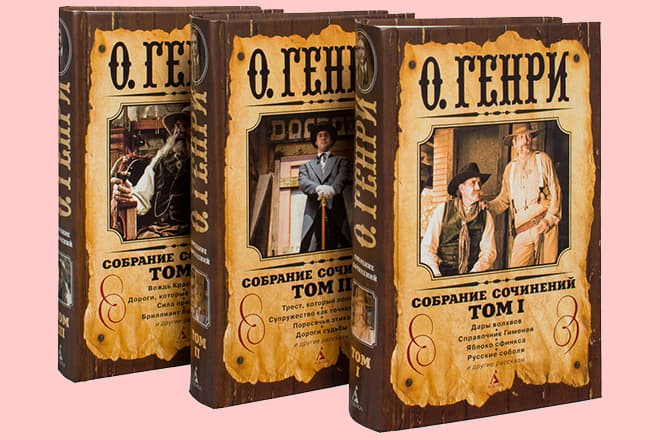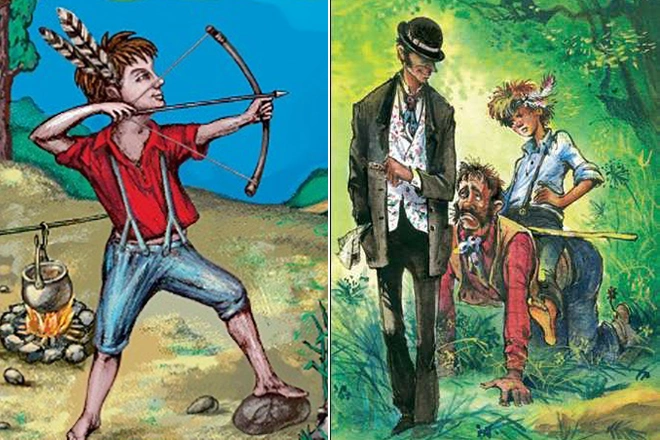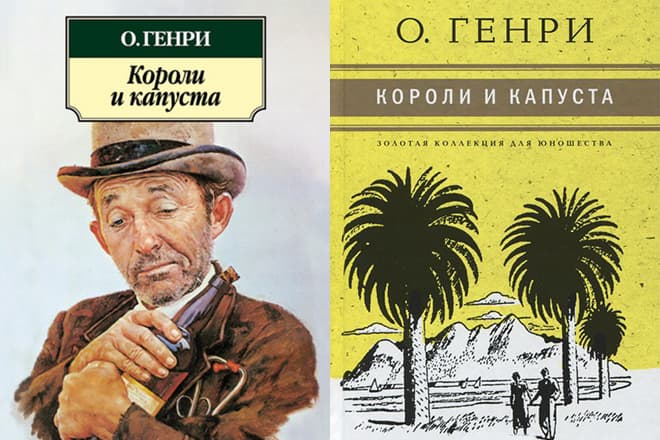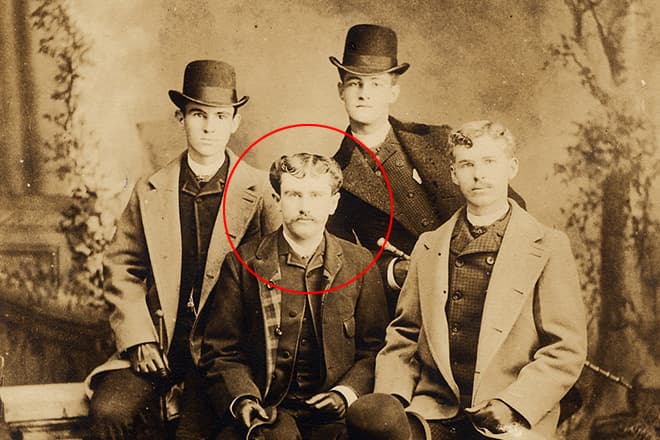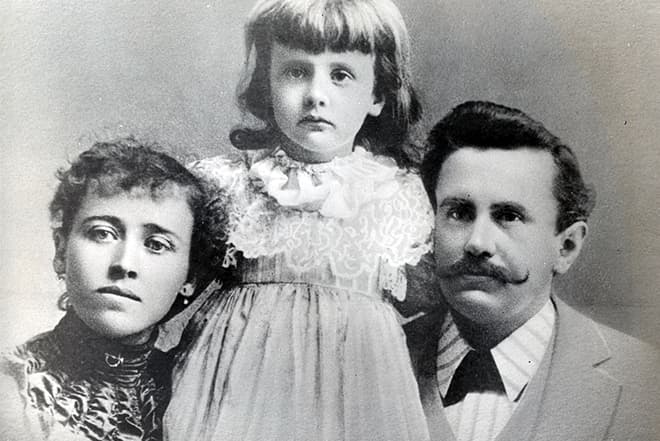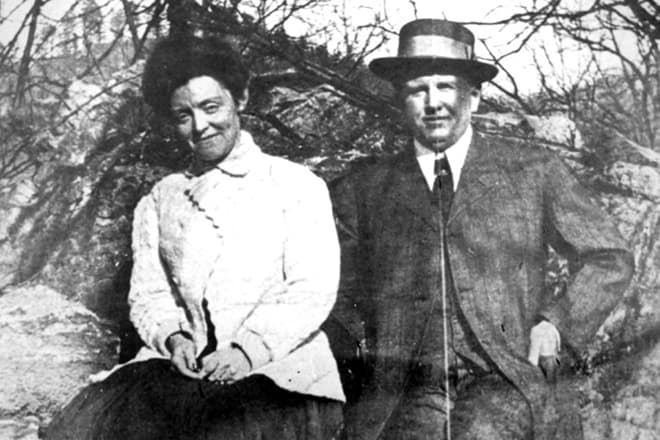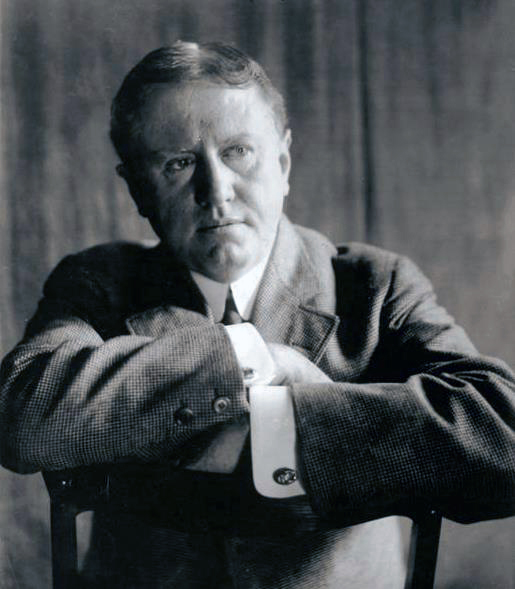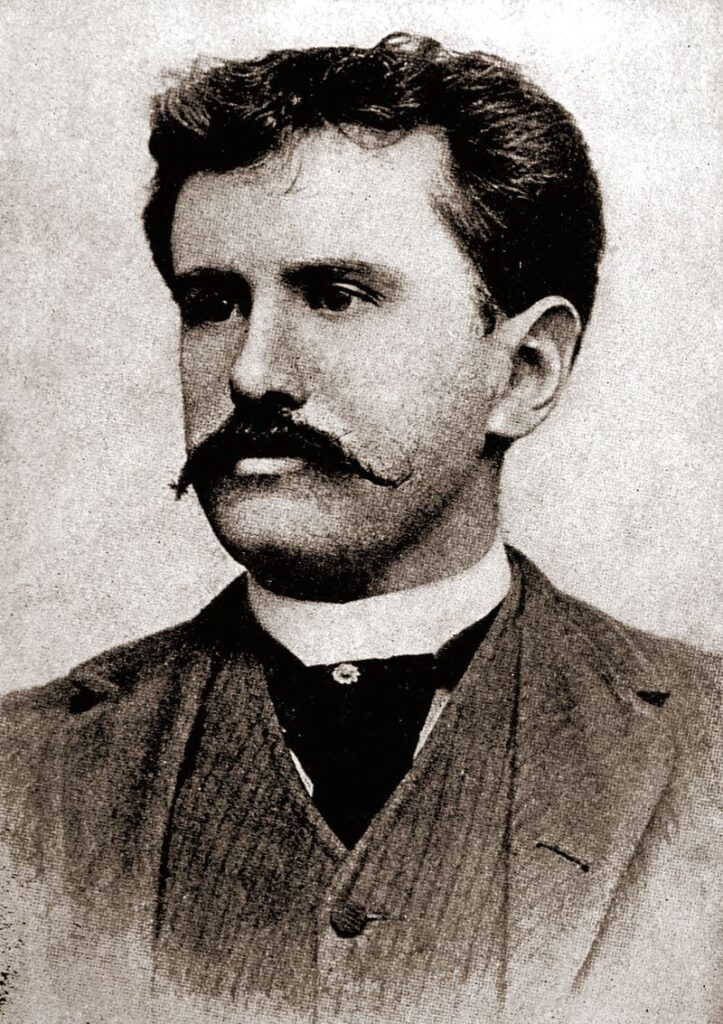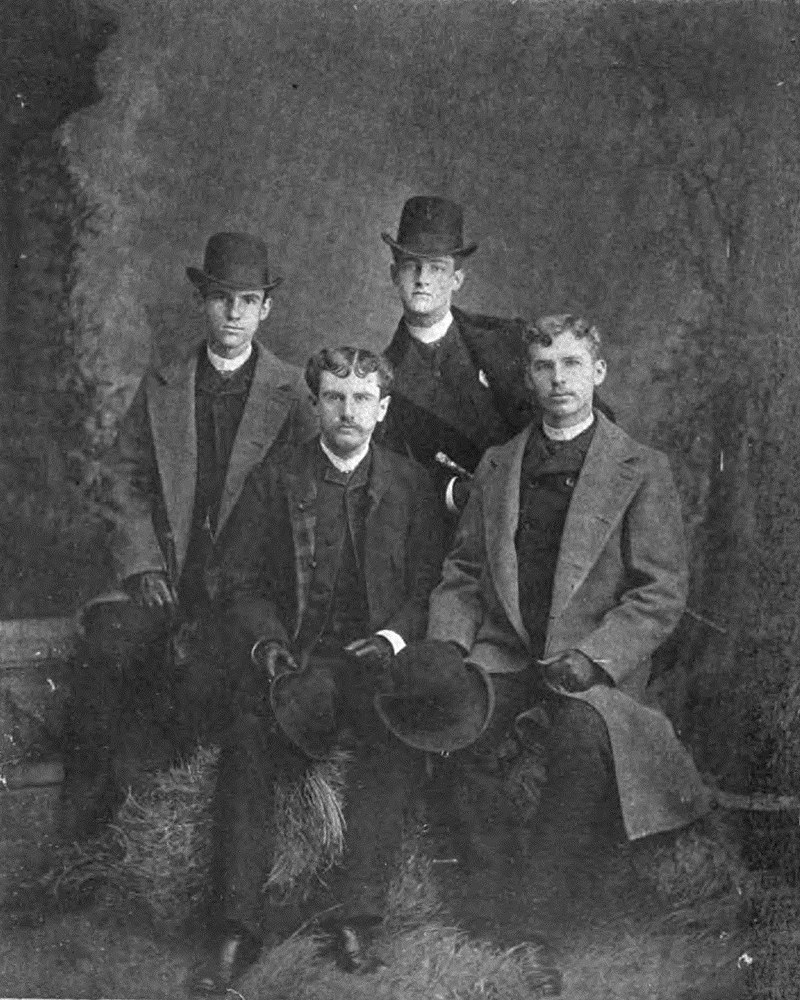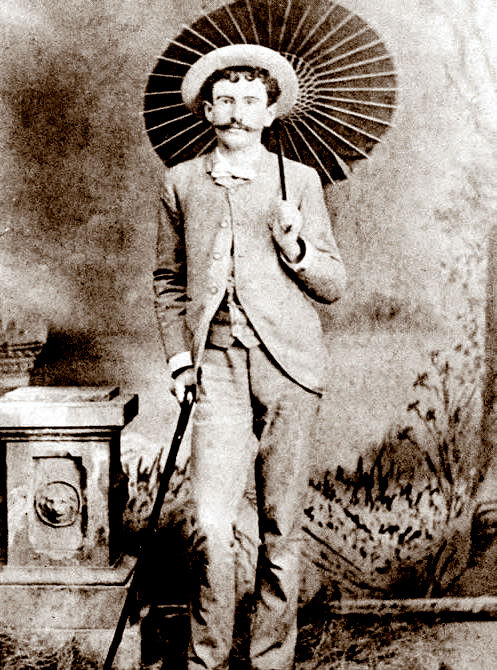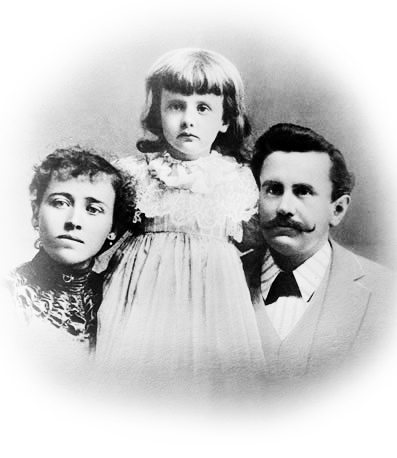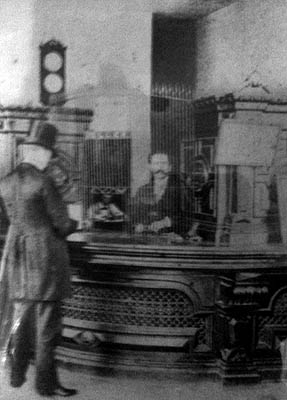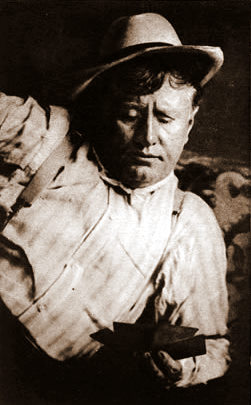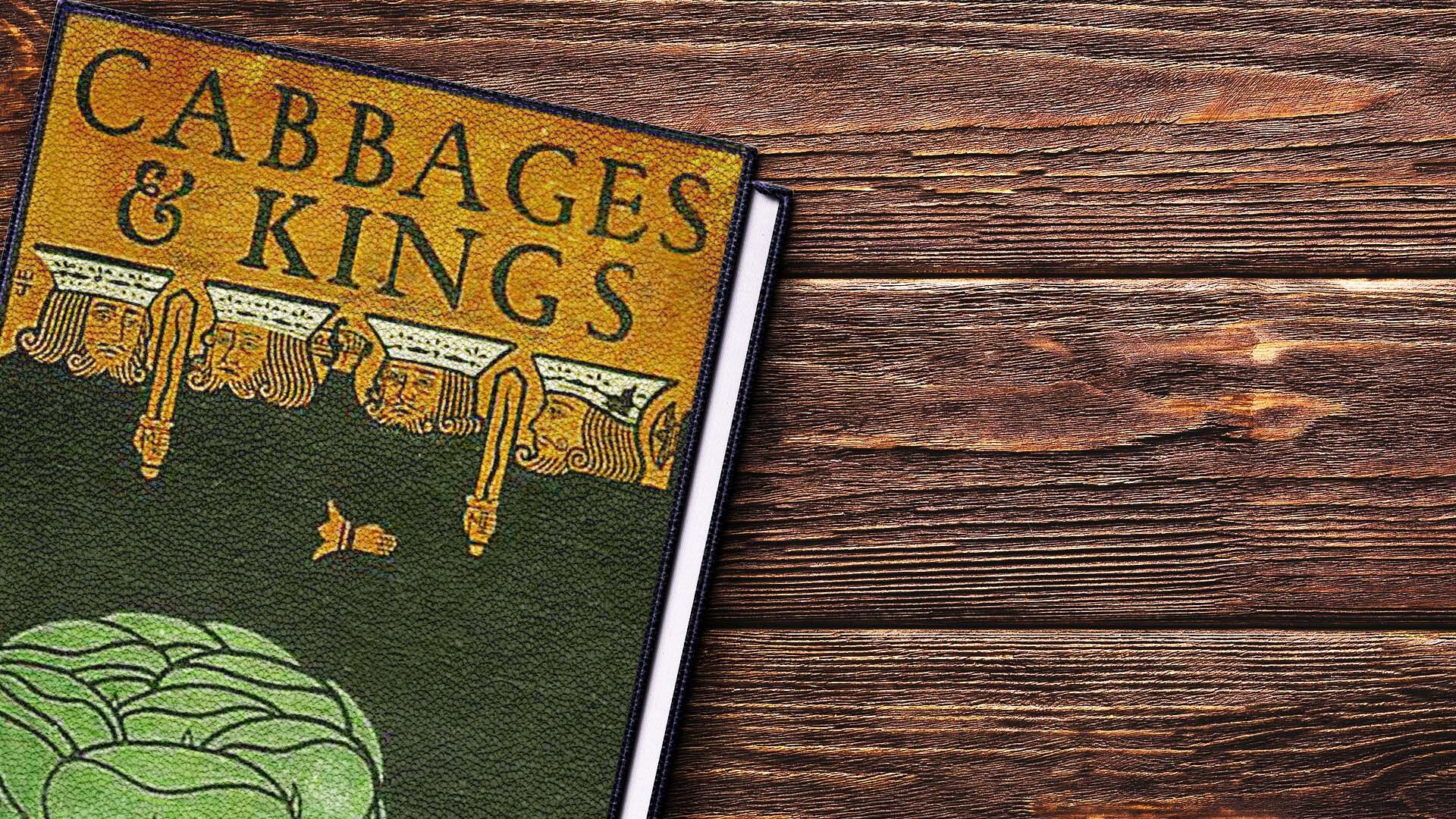|
William Sidney Porter |
|
|---|---|
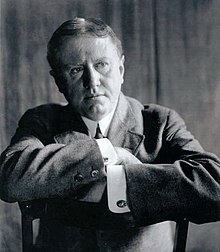
Portrait by W. M. Vanderweyde (1909) |
|
| Born | William Sidney Porter September 11, 1862 Greensboro, North Carolina, C.S. |
| Died | June 5, 1910 (aged 47) New York City, U.S. |
| Resting place | Riverside Cemetery, Asheville, NC |
| Pen name | O. Henry, Olivier Henry, Oliver Henry[1] |
| Occupation | Writer |
| Genre | Short story |
William Sydney Porter (September 11, 1862 – June 5, 1910), better known by his pen name O. Henry, was an American writer known primarily for his short stories, though he also wrote poetry and non-fiction. His works include «The Gift of the Magi», «The Duplicity of Hargraves», and «The Ransom of Red Chief», as well as the novel Cabbages and Kings. Porter’s stories are known for their naturalist observations, witty narration, and surprise endings.
Porter’s legacy includes the O. Henry Award, an annual prize awarded to outstanding short stories.
Biography[edit]
Early life[edit]
William Sidney Porter was born on September 11, 1862, in Greensboro, North Carolina, during the American Civil War. He changed the spelling of his middle name to Sydney in 1898. His parents were Algernon Sidney Porter (1825–88), a physician, and Mary Jane Virginia Swaim Porter (1833–65). William’s parents had married on April 20, 1858. When William was three, his mother died after giving birth to her third child, and he and his father moved into the home of his paternal grandmother. As a child, Porter was always reading, everything from classics to dime novels; his favorite works were Lane’s translation of One Thousand and One Nights and Burton’s Anatomy of Melancholy.[2]
Porter graduated from his aunt Evelina Maria Porter’s elementary school in 1876. He then enrolled at the Lindsey Street High School. His aunt continued to tutor him until he was 15. In 1879, he started working in his uncle’s drugstore in Greensboro, and on August 30, 1881, at the age of 19, Porter was licensed as a pharmacist. At the drugstore, he also showed his natural artistic talents by sketching the townsfolk.
Life in Texas[edit]
Porter as a young man in Austin
Porter traveled along with James K. Hall to Texas in March 1882, hoping that a change of air would help alleviate a persistent cough he had developed. He took up residence on the sheep ranch of Richard Hall, James Hall’s son, in La Salle County and helped out as a shepherd, ranch hand, cook, and baby-sitter. While on the ranch, he learned bits of Spanish and German from the mix of indigenous and immigrant ranch hands. He also spent time reading classic works of literature.
Porter’s health did improve. He traveled with Richard to Austin, Texas, in 1884, where he decided to remain and was welcomed into the home of Richard’s friends, Joseph Harrell and his wife. Porter resided with the Harrells for three years. He went to work briefly for the Morley Brothers Drug Company as a pharmacist. Porter then moved on to work for the Harrell Cigar Store located in the Driskill Hotel. He also began writing as a sideline and wrote many of his early stories in the Harrell house.
As a young bachelor, Porter led an active social life in Austin. He was known for his wit, story-telling and musical talents. He played both the guitar and mandolin. He sang in the choir at St. David’s Episcopal Church and became a member of the «Hill City Quartette», a group of young men who sang at gatherings and serenaded young women of the town.
The Porter family, early 1890s – Athol, daughter Margaret, William
Porter met and began courting Athol Estes, 17 years old and from a wealthy family. Historians believe Porter met Athol at the laying of the cornerstone of the Texas State Capitol on March 2, 1885. Her mother objected to the match because Athol was ill, suffering from tuberculosis. On July 1, 1887, Porter eloped with Athol and they were married in the parlor of the home of the Reverend R. K. Smoot, pastor of the Central Presbyterian Church, where the Estes family attended church. The couple continued to participate in musical and theater groups, and Athol encouraged her husband to pursue his writing. Athol gave birth to a son in 1888, who died hours after birth, and then daughter Margaret Worth Porter in September 1889.
Porter’s friend Richard Hall became Texas Land Commissioner and offered Porter a job. Porter started as a draftsman at the Texas General Land Office (GLO) on January 12, 1887, at a salary of $100 a month, drawing maps from surveys and fieldnotes. The salary was enough to support his family, but he continued his contributions to magazines and newspapers. In the GLO building, he began developing characters and plots for such stories as «Georgia’s Ruling» (1900), and «Buried Treasure» (1908). The castle-like building he worked in was woven into some of his tales such as «Bexar Scrip No. 2692» (1894). His job at the GLO was a political appointment by Hall. Hall ran for governor in the election of 1890 but lost. Porter resigned on January 21, 1891, the day after the new governor, Jim Hogg, was sworn in.
Porter as a clerk at the First National Bank in Austin, c. 1892
The same year, Porter began working at the First National Bank of Austin as a teller and bookkeeper at the same salary he had made at the GLO. The bank was operated informally, and Porter was apparently careless in keeping his books and may have embezzled funds. In 1894, he was accused by the bank of embezzlement and lost his job but was not indicted at the time.
He then worked full-time on his humorous weekly called The Rolling Stone, which he started while working at the bank. The Rolling Stone featured satire on life, people, and politics and included Porter’s short stories and sketches. Although eventually reaching a top circulation of 1,500, The Rolling Stone failed in April 1895 because the paper never provided an adequate income. However, his writing and drawings had caught the attention of the editor at the Houston Post.
Porter and his family moved to Houston in 1895, where he started writing for the Post. His salary was only $25 a month, but it rose steadily as his popularity increased. Porter gathered ideas for his column by loitering in hotel lobbies and observing and talking to people there. This was a technique he used throughout his writing career.
While he was in Houston, federal auditors audited the First National Bank of Austin and found the embezzlement shortages that led to his firing. A federal indictment followed, and he was arrested on charges of embezzlement.
Flight and return[edit]
After his arrest, Porter’s father-in-law posted his bail. He was due to stand trial on July 7, 1896, but the day before, as he was changing trains to get to the courthouse, he got scared. He fled, first to New Orleans and later to Honduras, with which the United States had no extradition treaty at that time. Porter lived in Honduras for six months, until January 1897. There he became friends with Al Jennings, a notorious train robber, who later wrote a book about their friendship.[3] He holed up in a Trujillo hotel, where he wrote Cabbages and Kings.
Porter had sent Athol and Margaret back to Austin to live with Athol’s parents. Unfortunately, Athol became too ill to meet Porter in Honduras as he had planned. When he learned that his wife was dying, Porter returned to Austin in February 1897 and surrendered to the court, pending trial. Athol Estes Porter died from tuberculosis (then known as consumption) on July 25, 1897.
Porter had little to say in his own defense at his trial and was found guilty on February 17, 1898, of embezzling $854.08. He was sentenced to five years in prison and imprisoned on March 25, 1898, at the Ohio Penitentiary in Columbus, Ohio. Porter was a licensed pharmacist and was able to work in the prison hospital as the night druggist. He was given his own room in the hospital wing, and there is no record that he actually spent time in the cell block of the prison. He had 14 stories published under various pseudonyms while he was in prison but was becoming best known as «O. Henry», a pseudonym that first appeared over the story «Whistling Dick’s Christmas Stocking» in the December 1899 issue of McClure’s Magazine. A friend of his in New Orleans would forward his stories to publishers so that they had no idea that the writer was imprisoned.
Porter was released on July 24, 1901, for good behavior after serving three years. He reunited with his daughter Margaret, now age 11, in Pittsburgh, Pennsylvania, where Athol’s parents had moved after Porter’s conviction.
Later life and death[edit]
Porter’s most prolific writing period started in 1902, when he moved to New York City to be near his publishers. While there, he wrote 381 short stories. He wrote a story a week for over a year for the New York World Sunday Magazine. His wit, characterization, and plot twists were adored by his readers but often panned by critics.
Porter married again in 1907 to childhood sweetheart Sarah (Sallie) Lindsey Coleman, whom he met again after revisiting his native state of North Carolina. Coleman was herself a writer and wrote a romanticized and fictionalized version of their correspondence and courtship in her novella Wind of Destiny.[4]
Porter was a heavy drinker, and by 1908, his markedly deteriorating health affected his writing. In 1909, Sarah left him, and he died on June 5, 1910, of cirrhosis of the liver, complications of diabetes, and an enlarged heart. According to one account, he died of cerebral hemorrhage.[5]
After funeral services in New York City, he was buried in the Riverside Cemetery in Asheville, North Carolina.[6] His daughter Margaret Worth Porter had a short writing career from 1913 to 1916. She married cartoonist Oscar Cesare of New York in 1916; they were divorced four years later. She died of tuberculosis in 1927 and was buried next to her father.
Stories[edit]
Most of Porter’s stories are set in his own time, the early 20th century. He had an obvious affection for New York City, which he called «Bagdad-on-the-Subway»,[7] and many of his stories are set there, while others are set in small towns or in other cities. They frequently feature working class characters, such as policemen and waitresses, as well as criminals and social outcasts. In his day he was called the American answer to French naturalist Guy de Maupassant, whose work was similarly concerned with the struggles of common people and often had twist endings.
Cabbages and Kings was his first collection of stories, followed by The Four Million. The second collection opens with a reference to Ward McAllister’s claim that there were «…only ‘Four Hundred’ people in New York City who were really worth noticing. But a wiser man has arisen—the census taker—and his larger estimate of human interest has been preferred in marking out the field of these little stories of the Four Million.»
His final work was «Dream», a short story intended for the magazine The Cosmopolitan. It was never completed.[8]
Among his most famous stories are:
- «The Gift of the Magi» is about a young couple, Jim and Della, who are short of money but desperately want to buy each other Christmas gifts. Unbeknownst to Jim, Della sells her most valuable possession, her beautiful hair, in order to buy a platinum fob chain for Jim’s watch; while unbeknownst to Della, Jim sells his own most valuable possession, his watch, to buy jeweled combs for Della’s hair. The essential premise of this story has been copied, re-worked, parodied, and otherwise re-told countless times in the century since it was written.
- «The Ransom of Red Chief» in which two men kidnap a boy of ten years old to ransom him. The boy turns out to be so spoiled and obnoxious that the desperate men ultimately pay the boy’s father $250 to take him back.
- «The Cop and the Anthem» about a New York City hobo named Soapy who sets out to get arrested so that he can be a guest of the city jail instead of sleeping out in the cold winter. Despite his best efforts at committing petty theft, vandalism, disorderly conduct, and «flirting» with a young prostitute, Soapy fails to draw the attention of the police. Dejected, he stops in front of a church, where an organ anthem inspires him to clean up his life; however, he is charged with loitering, and sentenced to three months in prison.
- «A Retrieved Reformation» tells the tale of safecracker Jimmy Valentine, a man recently freed from prison. He goes to a town bank to case it before he robs it. As he walks to the door, he catches the eye of the banker’s beautiful daughter. They immediately fall in love and Valentine decides to give up his criminal career. He moves into the town, taking up the identity of Ralph Spencer, a shoemaker. Just as he is about to leave to deliver his specialized tools to an old associate, a lawman who recognizes him arrives at the bank. Jimmy and his fiancée and her family are at the bank, inspecting a new safe when a child accidentally gets locked inside the airtight vault. Knowing it will seal his fate, Valentine opens the safe to rescue the child. However, much to Valentine’s surprise, the lawman denies recognizing him and lets him go.
- «The Duplicity of Hargraves» tells the story of the Talbots, a father and daughter from the Old South who move to Washington, DC, newly poor after the Civil War. An actor, Hargraves, offers Mr. Talbot money, which he is too proud to accept. But when Talbot is approached by an old man, a former slave who gives him money to settle an old family debt, he accepts it. It is later revealed that Hargraves secretly portrayed the slave.
- «The Caballero’s Way» in which Porter’s most famous character, the Cisco Kid, is introduced. It was first published in 1907 in the July issue of Everybody’s Magazine and collected in the book Heart of the West that same year. In later film and TV depictions, the Kid would be portrayed as a dashing adventurer, perhaps skirting the edges of the law, but primarily on the side of the angels. In the original short story, the only story by Porter to feature the character, the Kid is a murderous, ruthless border desperado, whose trail is dogged by a heroic Texas Ranger.
Pen name[edit]
Porter used a number of pen names (including «O. Henry» or «Olivier Henry») in the early part of his writing career; other names included S.H. Peters, James L. Bliss, T.B. Dowd, and Howard Clark.[9] Nevertheless, the name «O. Henry» seemed to garner the most attention from editors and the public, and was used exclusively by Porter for his writing by about 1902. He gave various explanations for the origin of his pen name.[10] In 1909, he gave an interview to The New York Times, in which he gave an account of it:
It was during these New Orleans days that I adopted my pen name of O. Henry. I said to a friend: «I’m going to send out some stuff. I don’t know if it amounts to much, so I want to get a literary alias. Help me pick out a good one.» He suggested that we get a newspaper and pick a name from the first list of notables that we found in it. In the society columns we found the account of a fashionable ball. «Here we have our notables,» said he. We looked down the list and my eye lighted on the name Henry, «That’ll do for a last name,» said I. «Now for a first name. I want something short. None of your three-syllable names for me.» «Why don’t you use a plain initial letter, then?» asked my friend. «Good,» said I, «O is about the easiest letter written, and O it is.»
A newspaper once wrote and asked me what the O stands for. I replied, «O stands for Olivier, the French for Oliver.» And several of my stories accordingly appeared in that paper under the name Olivier Henry.[11]
William Trevor writes in the introduction to The World of O. Henry: Roads of Destiny and Other Stories (Hodder & Stoughton, 1973) that «there was a prison guard named Orrin Henry» in the Ohio State Penitentiary «whom William Sydney Porter … immortalised as O. Henry».
According to J. F. Clarke, it is from the name of the French pharmacist Etienne Ossian Henry, whose name is in the U.S. Dispensary which Porter used working in the prison pharmacy.[12]
Writer and scholar Guy Davenport offers his own hypothesis: «The pseudonym that he began to write under in prison is constructed from the first two letters of Ohio and the second and last two of penitentiary.»[10]
Legacy[edit]
The O. Henry Award is a prestigious annual prize named after Porter and given to outstanding short stories.
A film was made in 1952 featuring five stories, called O. Henry’s Full House. The episode garnering the most critical acclaim[13] was «The Cop and the Anthem» starring Charles Laughton and Marilyn Monroe. The other stories are «The Clarion Call», «The Last Leaf», «The Ransom of Red Chief», and «The Gift of the Magi».
Strictly Business is a 1962 Soviet comedy film, directed by Leonid Gaidai, based on three short stories by O. Henry: «The Roads We Take», «Makes the Whole World Kin», and «The Ransom of Red Chief». The premiere of the film was timed to coincide with the 100th anniversary of the birth of the writer.
A 1957 television series The O. Henry Playhouse was syndicated in 39 episodes to 188 markets.[14] Actor Thomas Mitchell portrayed O. Henry in each episode as he interacted with his characters or related his latest story to his publisher or a friend.[15]
The 1986 Indian anthology television series Katha Sagar adapted several of Henry’s short stories as episodes including «The Last Leaf».
An opera in one long act, The Furnished Room, with music by Daniel Steven Crafts and libretto by Richard Kuss, is based on O. Henry’s story of the same name.
The O. Henry House and O. Henry Hall, both in Austin, Texas, are named for him. O. Henry Hall, now owned by the Texas State University System, previously served as the federal courthouse in which O. Henry was convicted of embezzlement. The O. Henry House has been the site of the O. Henry Pun-Off, an annual spoken word competition inspired by Porter’s love of language, since 1978.
Porter has elementary schools named for him in Greensboro, North Carolina (William Sydney Porter Elementary)[16] and Garland, Texas (O. Henry Elementary), as well as a middle school in Austin, Texas (O. Henry Middle School).[17] The O. Henry Hotel in Greensboro is also named for Porter, as is US 29 which is O. Henry Boulevard.
In 1962, the Soviet Postal Service issued a stamp commemorating O. Henry’s 100th birthday. On September 11, 2012, the United States Postal Service issued a stamp commemorating the 150th anniversary of O. Henry’s birth.[18]
On November 23, 2011, Barack Obama quoted O. Henry while granting pardons to two turkeys named «Liberty» and «Peace».[19] In response, political science professor P. S. Ruckman Jr. and Texas attorney Scott Henson filed a formal application for a posthumous pardon in September 2012, the same month that the U.S. Postal Service issued its O. Henry stamp.[20] Previous attempts were made to obtain such a pardon for Porter in the administrations of Woodrow Wilson, Dwight Eisenhower, and Ronald Reagan,[21] but no one had ever bothered to file a formal application.[22] Ruckman and Henson argued that Porter deserved a pardon because (1) he was a law-abiding citizen prior to his conviction; (2) his offense was minor; (3) he had an exemplary prison record; (4) his post-prison life clearly indicated rehabilitation; (5) he would have been an excellent candidate for clemency in his time, had he but applied for pardon; (6) by today’s standards, he remains an excellent candidate for clemency; and (7) his pardon would be a well-deserved symbolic gesture and more.[20] The pardon remains ungranted.
In 2021 the Library of America included O. Henry in their list by publishing a collection of 101 of his stories, edited by Ben Yagoda.[23]
Bibliography[edit]
Stories[edit]
Collections:
- Cabbages and Kings (1904), novel consisting of linked stories. Collection of 19 short stories:
- «The Proem: By the Carpenter», «‘Fox-in-the-Morning‘«, «The Lotus and the Bottle», «Smith», «Caught», «Cupid’s Exile Number Two», «The Phonograph and the Graft», «Money Maze», «The Admiral», «The Flag Paramount», «The Shamrock and the Palm», «The Remnants of the Code», «Shoes», «Ships», «Masters of Arts», «Dicky», «Rouge et Noir», «Two Recalls», «The Vitagraphoscope»
- The Four Million (1906), collection of 25 short stories:
- «Tobin’s Palm», «The Gift of the Magi», «A Cosmopolite in a Cafe», «Between Rounds», «The Skylight Room», «A Service of Love», «The Coming-Out of Maggie», «Man About Town», «The Cop and the Anthem», «An Adjustment of Nature», «Memoirs of a Yellow Dog», «The Love-Philtre of Ikey Schoenstein», «Mammon and the Archer», «Springtime à la Carte», «The Green Door», «From the Cabby’s Seat», «An Unfinished Story», «The Caliph, Cupid and the Clock», «Sisters of the Golden Circle», «The Romance of a Busy Broker», «After Twenty Years», «Lost on Dress Parade», «By Courier», «The Furnished Room», «The Brief Debut of Tildy»
- The Trimmed Lamp (1907), collection of 25 short stories:
- «The Trimmed Lamp», «A Madison Square Arabian Night», «The Rubaiyat of a Scotch Highball», «The Pendulum», «Two Thanksgiving Day Gentlemen», «The Assessor of Success», «The Buyer from Cactus City», «The Badge of Policeman O’Roon», «Brickdust Row» (made into the 1918 film, Everybody’s Girl), «The Making of a New Yorker», «Vanity and Some Sables», «The Social Triangle», «The Purple Dress», «The Foreign Policy of Company 99», «The Lost Blend», «A Harlem Tragedy», «‘The Guilty Party‘«, «A Midsummer Knight’s Dream», «According to Their Lights», «The Last Leaf», «The Count and the Wedding Guest», «The Country of Elusion», «The Ferry of Unfulfilment», «The Tale of a Tainted Tenner», «Elsie in New York»
- Heart of the West (1907), collection of 19 short stories:
- «Hearts and Crosses», «The Ransom of Mack», «Telemachus, Friend», «The Handbook of Hymen», «The Pimienta Pancakes», «Seats of the Haughty», «Hygeia at the Solito», «An Afternoon Miracle», «The Higher Abdication», «Cupid à la Carte», «The Caballero’s Way», «The Sphinx Apple», «The Missing Chord», «A Call Loan», «The Princess and the Puma», «The Indian Summer of Dry Valley Johnson», «Christmas by Injunction», «A Chaparral Prince», «The Reformation of Calliope»
- The Gentle Grafter (1908), collection of 14 short stories:
- «The Octopus Marooned», «Jeff Peters as a Personal Magnet», «Modern Rural Sports», «The Chair of Philanthromathematics», «The Hand That Riles the World», «The Exact Science of Matrimony», «A Midsummer Masquerade», «Shearing the Wolf», «Innocents of Broadway», «Conscience in Art», «The Man Higher Up», «Tempered Wind», «Hostages to Momus», «The Ethics of Pig»
- The Voice of the City (1908), collection of 25 short stories:
- «The Voice of the City», «The Complete Life of John Hopkins», «A Lickpenny Lover», «Dougherty’s Eye-opener», «‘Little Speck in Garnered Fruit‘«, «The Harbinger», «While the Auto Waits», «A Comedy in Rubber», «One Thousand Dollars», «The Defeat of the City», «The Shocks of Doom», «The Plutonian Fire», «Nemesis and the Candy Man», «Squaring the Circle», «Roses, Ruses and Romance», «The City of Dreadful Night», «The Easter of the Soul», «The Fool-killer», «Transients in Arcadia», «The Rathskeller and the Rose», «The Clarion Call», «Extradited from Bohemia», «A Philistine in Bohemia», «From Each According to His Ability», «The Memento»
- Roads of Destiny (1909), collection of 22 short stories:
- «Roads of Destiny», «The Guardian of the Accolade», «The Discounters of Money», «The Enchanted Profile», «Next to Reading Matter», «Art and the Bronco», «Phoebe», «A Double-dyed Deceiver», «The Passing of Black Eagle», «A Retrieved Reformation», «Cherchez la Femme», «Friends in San Rosario», «The Fourth in Salvador», «The Emancipation of Billy», «The Enchanted Kiss», «A Departmental Case», «The Renaissance at Charleroi», «On Behalf of the Management», «Whistling Dick’s Christmas Stocking», «The Halberdier of the Little Rheinschloss», «Two Renegades», «The Lonesome Road»
- Options (1909), collection of 16 short stories:
- «‘The Rose of Dixie‘«, «The Third Ingredient», «The Hiding of Black Bill», «Schools and Schools», «Thimble, Thimble», «Supply and Demand», «Buried Treasure», «To Him Who Waits», «He Also Serves», «The Moment of Victory», «The Head-hunter», «No Story», «The Higher Pragmatism», «Best-seller», «Rus in Urbe», «A Poor Rule»
- The Two Women (1910), collection of 2 short stories:
- «A Fog in Santone», «Blind Man’s Holiday»
- Strictly Business (1910), collection of 23 short stories:
- «Strictly Business», «The Gold That Glittered», «Babes in the Jungle», «The Day Resurgent», «The Fifth Wheel», «The Poet and the Peasant», «The Robe of Peace», «The Girl and the Graft», «The Call of the Tame», «The Unknown Quantity», «The Thing’s the Play», «A Ramble in Aphasia», «A Municipal Report», «Psyche and the Pskyscraper», «A Bird of Bagdad», «Compliments of the Season», «A Night in New Arabia», «The Girl and the Habit», «Proof of the Pudding», «Past One at Rooney’s», «The Venturers», «The Duel», «‘What You Want‘«
- Whirligigs (1910), collection of 24 short stories:
- «The World and the Door», «The Theory and the Hound», «The Hypotheses of Failure», «Calloway’s Code», «A Matter of Mean Elevation», «Girl», «Sociology in Serge and Straw», «The Ransom of Red Chief», «The Marry Month of May», «A Technical Error», «Suite Homes and Their Romance», «The Whirligig of Life», «A Sacrifice Hit», «The Roads We Take», «A Blackjack Bargainer», «The Song and the Sergeant», «One Dollar’s Worth», «A Newspaper Story», «Tommy’s Burglar», «A Chaparral Christmas Gift», «A Little Local Colour», «Georgia’s Ruling», «Blind Man’s Holiday», «Madame Bo-Peep of the Ranches»
- Sixes and Sevens (1911), collection of 25 short stories:
- «The Last of the Troubadours», «The Sleuths», «Witches’ Loaves», «The Pride of the Cities», «Holding Up a Train», «Ulysses and the Dogman», «The Champion of the Weather», «Makes the Whole World Kin», «At Arms with Morpheus», «A Ghost of a Chance», «Jimmy Hayes and Muriel», «The Door of Unrest», «The Duplicity of Hargraves», «Let Me Feel Your Pulse», «October and June», «The Church with an Overshot-Wheel», «New York by Camp Fire Light», «The Adventures of Shamrock Jolnes», «The Lady Higher Up», «The Greater Coney», «Law and Order», «Transformation of Martin Burney», «The Caliph and the Cad», «The Diamond of Kali», «The Day We Celebrate»
- Rolling Stones (1912), collection of
- 23 short stories: «The Dream», «A Ruler of Men», «The Atavism of John Tom Little Bear», «Helping the Other Fellow», «The Marionettes», «The Marquis and Miss Sally», «A Fog in Santone», «The Friendly Call», «A Dinner at ———», «Sound and Fury» (1903, «Tictocq», «Tracked to Doom», «A Snapshot at the President», «An Unfinished Christmas Story», «The Unprofitable Servant», «Aristocracy Versus Hash», «The Prisoner of Zembla», «A Strange Story», «Fickle Fortune, or How Gladys Hustled», «An Apology», «Lord Oakhurst’s Curse», «Bexar Scrip No. 2692.», «Queries and Answers»
- 12 poems:
- «The Pewee», «Nothing to say», «The Murderer»
- Some Postscripts: «Two Portraits», «A Contribution», «The Old Farm», «Vanity», «The Lullaby Boy», «Chanson de Bohême», «Hard to Forget», «Drop a Tear in This Slot», «Tamales»
- letters: «Some Letters»
- Waifs and Strays (1917), collection of 12 short stories:
- «The Red Roses of Tonia», «Round The Circle», «The Rubber Plant’s Story», «Out of Nazareth», «Confessions of a Humorist», «The Sparrows in Madison Square», «Hearts and Hands», «The Cactus», «The Detective Detector», «The Dog and the Playlet», «A Little Talk About Mobs», «The Snow Man»
- O. Henryana (1920), collection of 7 short stories:
- «The Crucible», «A Lunar Episode», «Three Paragraphs», «Bulger’s Friend», «A Professional Secret», «The Elusive Tenderloin», «The Struggle of the Outliers»
- Postscripts (1923), collection of 103 short stories, 26 poems and 4 articles:
- «The Sensitive Colonel Jay», «Taking No Chances», «A Matter of Loyalty», «The Other Side of It», «Journalistically Impossible», «The Power of Reputation», «The Distraction of Grief», «A Sporting Interest», «Had A Use for It», «The Old Landmark», «A Personal Insult», «Toddlekins» (poem), «Reconciliation», «Buying a Piano», «Too Late», «Nothing to say» (poem), «‘Goin Home fur Christmas‘» (poem), «Just a Little Damp», «Her Mysterious Charm», «Convinced», «His Dilemma», «Something for Baby» (poem), «Some Day», «A Green Hand», «A Righteous Outburst», «Getting at the Facts», «Just for a Change» (poem), «Too Wise», «A Fatal Error», «Prompt» (poem), «An Opportunity Declined», «Correcting a Great Injustice», «A Startling Demonstration», «Leap Year Advice» (article), «After Supper», «His Only Opportunity», «Getting Acquainted», «Answers to Inquiries» (article), «City Peril», «Hush Money», «Relieved», «No Time to Lose», «A Villainous Trick», «A Forced March» (poem), «Book Review» (article), «A Conditional Pardon», «Inconsistency» (poem), «Bill Nye», «To a Portrait» (poem), «A Guarded Secret», «A Pastel», «Jim» (poem), «Board and Ancestors», «An X-Ray Fable», «A Universal Favorite», «Spring» (poem), «The Sporting Editor on Culture», «A Question of Direction», «The Old Farm» (poem), «Willing to Compromise», «Ridiculous», «Guessed Everything Else», «The Prisoner of Zembla», «Lucky Either Way», «The Bad Man», «Slight Mistake», «Delayed», «A Good Story Spoiled», «Revenge», «No Help for It», «Riley’s Luck» (poem), «Not So Much a Tam Fool», «A Guess-Proof Mystery Story», «Futility» (poem), «Wounded Veteran», «Her Ruse», «Why Conductors Are Morose», «The Pewee» (poem), «‘Only to Lie-‘» (poem), «The Sunday Excursionist», «Decoration Day», «Charge of the White Brigade» (poem), «An Inspiration», «Coming To Him», «His Pension», «Winner», «Hungry Henry’s Ruse», «A Proof Of Love» (poem), «One Consolation», «An Unsuccessful Experiment», «Superlatrives» (poem), «By Easy Stages», «Even Worse», «The Shock», «The Cynic», «Speaking of Big Winds», «An Original Idea», «Calculations», «A Valedictory», «Solemn Thoughts», «Explaining It», «Her Failing», «A Disagreement», «An E for a Knee» (poem), «The Unconquerable» (poem), «An Expensive Veracity», «Grounds for Uneasiness», «It Covers Errors» (poem), «Recognition», «His Doubt», «A Cheering Thought», «What It Was», «Vanity» (poem), «Identified», «The Apple», «How It Started», «How Red Conlin Told the Widow», «Why He Hesitated», «Turkish Questions» (poem), «Somebody Lied», «Marvelous», «The Confession of a Murderer», «Get Off the Earth» (poem), «The Stranger’s Appeal», «The Good Boy», «The Colonel’s Romance», «A Narrow Escape», «A Year’s Supply», «Eugene Field» (poem), «Slightly Mixed», «Knew What Was Needed», «Some Ancient News Notes» (article), «A Sure Method»
- O. Henry Encore (1939), collection of 27 short stories, 7 sketches and 10 poems:
- Part one. Stories: «A Night Errant», «In Mezzotint», «The Dissipated Jeweller», «How Willie Saved Father», «The Mirage on the Frio», «Sufficient Provocation», «The Bruised Reed», «Paderewski’s Hair», «A Mystery of Many Centuries», «A Strange Case», «Simmons’ Saturday Night», «An Unknown Romance», «Jack the Giant Killer», «The Pint Flask», «An Odd Character», «A Houston Romance», «The Legend of San Jacinto», «Binkley’s Practical School of Journalism», «A New Microbe», «Vereton Villa», «Whisky Did It», «Nothing New Under the Sun», «Led Astray», «A Story for Men», «How She Got in the Swim», «The Barber Talks», «Barber Shop Adventure»
- Part two. Sketches: «Did You See the Circus», «Thanksgiving Remarks», «When the Train Comes in», «Christmas Eve», «New Year’s Eve and Now it Came to Houston», «‘Watchman, What of the Night?‘«, «Newspaper Poets»
- Part three. Newspaper Poetry: «Topical Verse», «Cap Jessamines», «The Cricket», «My Broncho», «The Modern Venus», «Celestial Sounds», «The Snow», «Her Choice», «‘Little Things, but Ain’t They Whizzers?‘«, «Last Fall of the Alamo»
Uncollected short stories:
- «Tictocq, the Great French Detective» (1894)
- «Tictocq, the Great French Detective; or, A Soubrette’s Diamonds» (1894)
- «A Blow All ‘Round» (1895)
- «A Chicago Proposal» (1895)
- «A Fishy Story» (1895)
- «A Foretaste» (1895)
- «A Literal Caution» (1895)
- «A Philadelphia Diagnosis» (1895)
- «A Thousand Dollar Poem, was what the Literary Judgment of the Business Manager Lost for the Paper» (1895)
- «All Right» (1895)
- «And Put Up a Dime» (1895)
- «Arrived» (1895)
- «As Her Share» (1895)
- «Ballad of the Passionate Eye» (1895)
- «Cheaper in Quantities» (1895)
- «Didn’t Want Him Back» (1895)
- «Do You Know?» (1895)
- «Enlarging His Field» (1895)
- «Entirely Successful» (1895)
- «Extremes Met» (1895)
- «False to His Colors» (1895)
- «Family Pride» (1895)
- «He Was Behind With His Board» (1895)
- «Her Reckoning» (1895)
- «His Last Chance» (1895)
- «Making the Most of It» (1895)
- «Might Be» (1895)
- «Military or Millinery?» (1895)
- «No Chestnuts Were Served» (1895)
- «No Earlier» (1895)
- «Not Hers» (1895)
- «Not Official Statistics, However» (1895)
- «Palmistry» (1895)
- «Prodigality» (1895)
- «Professional, But Doubtful» (1895)
- «Prudent Precautions» (1895)
- «Same Thing» (1895)
- «Self Conceit» (1895)
- «Silver Question Settled» (1895)
- «Sunday Journalism, Memoranda of the Sabbath Editor of the New York Daily for Next Sunday’s Contents» (1895)
- «The Fate It Deserved» (1895)
- «The Man at the Window» (1895)
- «The Modern Kind» (1895)
- «The New Hero» (1895)
- «The Odor Located» (1895)
- «The Teacher Taught» (1895)
- «The White Feather» (1895)
- «Uncle Sam’s Wind» (1895)
- «Whole Handfuls» (1895)
- «Will She Fight as She Jokes? Here Are Some Translations of Recent Spanish Humour» (1895)
- «Yellow Specials, Latest Style of News Write Ups adopted by the sulphur-hued journals» (1895)
- «A Tragedy» (1896, as The Postman)
- «At an Auction» (1896)
- «Telegram» (1896)
- «His Courier» (1902)
- «The Flag» (1902)
- «The Guardian of the Scutcheon» (1903, as Olivier Henry)
- «The Lotus and the Cockleburrs» (1903)
- «The Point of the Story» (1903, as Sydney Porter)
- «The Quest of Soapy» (1908)
- «A Christmas Pi» (1909, as O. H-nry)
- «Adventures in Neurasthenia» (1910)
- «Last Story» (1910)
Poems[edit]
Uncollected poems:
- «Already Provided» (1895)
- «Archery» (1895)
- «At Cockcrow» (1895)
- «Honeymoon Vapourings» (1895)
- «Never, Until Now» (1895)
- «Ornamental» (1895)
- «The Imported Brand» (1895)
- «The Morning glory» (1895)
- «The White Violet» (1895)
- «To Her» (XRay) Photograph» (1895)
- «Unseeing» (1895)
- «Promptings» (1899)
- «Sunset in the Far North» (1901)
- «The Captive» (1901)
- «Uncaptured Joy» (1901)
- «April» (1903)
- «Auto Bugle Song» (1903)
- «June» (1903)
- «Remorse» (1903)
- «Spring in the City» (1903)
- «To a Gibson Girl» (1903)
- «Two Chapters» (1903)
- «A Floral Valentine» (1905)
Non-fiction[edit]
- Later Definitions (1895)
- The Reporter’s Private Lexicon (1903)
- Letter 1883 (1912)
- Letters 1884, 1885 (1912)
- Letters 1905 (1914)
- Letters from Prison to his Daughter Margaret (1916)
- Letter 1901 (1917)
- Letters (1921)
- Letters to Lithopolis: from O. Henry to Mabel Wagnalls (1922)
- Letters (1923)
- Letter (1928)
- Letters 1906, 1909 (1931)
- Letters, etc. of 1883 (1931)
References[edit]
- ^ «The Marquis and Miss Sally», Everybody’s Magazine, vol 8, issue 6, June 1903, appeared under the byline «Oliver Henry»
- ^ Chisholm, Hugh, ed. (1922). «Henry, O.» . Encyclopædia Britannica (12th ed.). London & New York: The Encyclopædia Britannica Company.
- ^ «Biography: O. Henry». North Carolina History. Retrieved March 10, 2014.
- ^ Current-Garcia, Eugene (1993). O. Henry: A Study of the Short Fiction (First ed.). New York City: Twayne Publishers, Macmillan Publishing Co. p. 123. ISBN 0-8057-0859-6.
- ^ Brown CT (October 1967). «O. Henry the pharmacist». Mil Med. 132 (10): 823–825. doi:10.1093/milmed/132.10.823. PMID 4965475.
- ^ Darty, Joshua (2018). Asheville’s Riverside Cemetery. ISBN 9781467128193.
- ^ Henry, O. «A Madison Square Arabian Night,» from The Trimmed Lamp: «Oh, I know what to do when I see victuals coming toward me in little old Bagdad-on-the-Subway. I strike the asphalt three times with my forehead and get ready to spiel yarns for my supper. I claim descent from the late Tommy Tucker, who was forced to hand out vocal harmony for his pre-digested wheaterina and spoopju.» The Trimmed Lamp, Project Gutenberg text
- ^ Henry, O. «Dream». Read Book Online website. Archived from the original on October 19, 2014. Retrieved April 22, 2014.
- ^ «Porter, William Sydney (O. Henry)». Ncpedia.org.
- ^ a b Guy Davenport, The Hunter Gracchus and Other Papers on Literature and Art, Washington, D.C.: Counterpoint, 1996.
- ^ «‘O. Henry’ on Himself, Life, and Other Things» (PDF), New York Times, April 4, 1909, p. SM9.
- ^ Joseph F. Clarke (1977). Pseudonyms. BCA. p. 83.
- ^ Crowther, Bosley (October 17, 1952). «THE SCREEN IN REVIEW; Four O. Henry Short Stories Offered in Fox Movie at Trans-Lux 52d Street». New York Times. Retrieved November 17, 2017.
- ^ The Billboard, May 13, 1957.
- ^ «Celebrating The O. Henry Playhouse». ohenryplayhouse.com. Retrieved February 14, 2022.
- ^ Arnett, Ethel Stephens (1973). For Whom Our Public Schools Were Named, Greensboro, North Carolina. Piedmont Press. p. 245.
- ^ «O. Henry Middle School, Austin, TX». Archive.austinisd.org. Archived from the original on October 4, 2011. Retrieved March 25, 2014.
- ^ «Celebrating Master Storyteller O. Henry’s 150th Birthday Anniversary». U.S. Postal Service. About.usps.com. Retrieved March 25, 2014.
- ^ Mark Memmot, «Obama Quotes O. Henry on ‘Purely American’ Nature of Thanksgiving», The Two-Way, NPR.org. Retrieved September 26, 2013.
- ^ a b Jim Schlosser, «Please Mr. President, Pardon O. Henry Archived September 28, 2013, at the Wayback Machine», O. Henry Magazine, October 2013. Retrieved September 26, 2013.
- ^ «Presidential Pardons: Few from Obama, and None for O. Henry». Go.bloomberg.com. February 21, 2013. Archived from the original on June 26, 2014. Retrieved March 25, 2014.
- ^ Edith Evan Asbury, «For O. Henry, a Hometown Festival», The New York Times, April 13, 1985. Retrieved September 26, 2013.
- ^ «O. Henry: 101 Stories Edited by Ben Yagoda». Library of America. Retrieved September 14, 2021.
Further reading[edit]
- Smith, C. Alphonso (November 1916). «The Strange Case of Sydney Porter and ‘O. Henry’«. The World’s Work: A History of Our Time. XXXIII (1): 54–64. Retrieved February 26, 2019.
External links[edit]
- Works by O. Henry in eBook form at Standard Ebooks
- Works by O. Henry at Project Gutenberg
- Works by or about O. Henry at Internet Archive
- Works by O. Henry at LibriVox (public domain audiobooks)
- O. Henry Museum
- Biography and Works at LiteratureCollection.com
- «His Writers’ Workshop? A Prison Cell», John J. Miller, The Wall Street Journal, June 8, 2010
- O. Henry at IMDb
- O. Henry item search at the Portal to Texas History (texashistory.unt.edu)
- O. Henry at Library of Congress Authorities, with 235 catalog records
|
William Sidney Porter |
|
|---|---|

Portrait by W. M. Vanderweyde (1909) |
|
| Born | William Sidney Porter September 11, 1862 Greensboro, North Carolina, C.S. |
| Died | June 5, 1910 (aged 47) New York City, U.S. |
| Resting place | Riverside Cemetery, Asheville, NC |
| Pen name | O. Henry, Olivier Henry, Oliver Henry[1] |
| Occupation | Writer |
| Genre | Short story |
William Sydney Porter (September 11, 1862 – June 5, 1910), better known by his pen name O. Henry, was an American writer known primarily for his short stories, though he also wrote poetry and non-fiction. His works include «The Gift of the Magi», «The Duplicity of Hargraves», and «The Ransom of Red Chief», as well as the novel Cabbages and Kings. Porter’s stories are known for their naturalist observations, witty narration, and surprise endings.
Porter’s legacy includes the O. Henry Award, an annual prize awarded to outstanding short stories.
Biography[edit]
Early life[edit]
William Sidney Porter was born on September 11, 1862, in Greensboro, North Carolina, during the American Civil War. He changed the spelling of his middle name to Sydney in 1898. His parents were Algernon Sidney Porter (1825–88), a physician, and Mary Jane Virginia Swaim Porter (1833–65). William’s parents had married on April 20, 1858. When William was three, his mother died after giving birth to her third child, and he and his father moved into the home of his paternal grandmother. As a child, Porter was always reading, everything from classics to dime novels; his favorite works were Lane’s translation of One Thousand and One Nights and Burton’s Anatomy of Melancholy.[2]
Porter graduated from his aunt Evelina Maria Porter’s elementary school in 1876. He then enrolled at the Lindsey Street High School. His aunt continued to tutor him until he was 15. In 1879, he started working in his uncle’s drugstore in Greensboro, and on August 30, 1881, at the age of 19, Porter was licensed as a pharmacist. At the drugstore, he also showed his natural artistic talents by sketching the townsfolk.
Life in Texas[edit]
Porter as a young man in Austin
Porter traveled along with James K. Hall to Texas in March 1882, hoping that a change of air would help alleviate a persistent cough he had developed. He took up residence on the sheep ranch of Richard Hall, James Hall’s son, in La Salle County and helped out as a shepherd, ranch hand, cook, and baby-sitter. While on the ranch, he learned bits of Spanish and German from the mix of indigenous and immigrant ranch hands. He also spent time reading classic works of literature.
Porter’s health did improve. He traveled with Richard to Austin, Texas, in 1884, where he decided to remain and was welcomed into the home of Richard’s friends, Joseph Harrell and his wife. Porter resided with the Harrells for three years. He went to work briefly for the Morley Brothers Drug Company as a pharmacist. Porter then moved on to work for the Harrell Cigar Store located in the Driskill Hotel. He also began writing as a sideline and wrote many of his early stories in the Harrell house.
As a young bachelor, Porter led an active social life in Austin. He was known for his wit, story-telling and musical talents. He played both the guitar and mandolin. He sang in the choir at St. David’s Episcopal Church and became a member of the «Hill City Quartette», a group of young men who sang at gatherings and serenaded young women of the town.
The Porter family, early 1890s – Athol, daughter Margaret, William
Porter met and began courting Athol Estes, 17 years old and from a wealthy family. Historians believe Porter met Athol at the laying of the cornerstone of the Texas State Capitol on March 2, 1885. Her mother objected to the match because Athol was ill, suffering from tuberculosis. On July 1, 1887, Porter eloped with Athol and they were married in the parlor of the home of the Reverend R. K. Smoot, pastor of the Central Presbyterian Church, where the Estes family attended church. The couple continued to participate in musical and theater groups, and Athol encouraged her husband to pursue his writing. Athol gave birth to a son in 1888, who died hours after birth, and then daughter Margaret Worth Porter in September 1889.
Porter’s friend Richard Hall became Texas Land Commissioner and offered Porter a job. Porter started as a draftsman at the Texas General Land Office (GLO) on January 12, 1887, at a salary of $100 a month, drawing maps from surveys and fieldnotes. The salary was enough to support his family, but he continued his contributions to magazines and newspapers. In the GLO building, he began developing characters and plots for such stories as «Georgia’s Ruling» (1900), and «Buried Treasure» (1908). The castle-like building he worked in was woven into some of his tales such as «Bexar Scrip No. 2692» (1894). His job at the GLO was a political appointment by Hall. Hall ran for governor in the election of 1890 but lost. Porter resigned on January 21, 1891, the day after the new governor, Jim Hogg, was sworn in.
Porter as a clerk at the First National Bank in Austin, c. 1892
The same year, Porter began working at the First National Bank of Austin as a teller and bookkeeper at the same salary he had made at the GLO. The bank was operated informally, and Porter was apparently careless in keeping his books and may have embezzled funds. In 1894, he was accused by the bank of embezzlement and lost his job but was not indicted at the time.
He then worked full-time on his humorous weekly called The Rolling Stone, which he started while working at the bank. The Rolling Stone featured satire on life, people, and politics and included Porter’s short stories and sketches. Although eventually reaching a top circulation of 1,500, The Rolling Stone failed in April 1895 because the paper never provided an adequate income. However, his writing and drawings had caught the attention of the editor at the Houston Post.
Porter and his family moved to Houston in 1895, where he started writing for the Post. His salary was only $25 a month, but it rose steadily as his popularity increased. Porter gathered ideas for his column by loitering in hotel lobbies and observing and talking to people there. This was a technique he used throughout his writing career.
While he was in Houston, federal auditors audited the First National Bank of Austin and found the embezzlement shortages that led to his firing. A federal indictment followed, and he was arrested on charges of embezzlement.
Flight and return[edit]
After his arrest, Porter’s father-in-law posted his bail. He was due to stand trial on July 7, 1896, but the day before, as he was changing trains to get to the courthouse, he got scared. He fled, first to New Orleans and later to Honduras, with which the United States had no extradition treaty at that time. Porter lived in Honduras for six months, until January 1897. There he became friends with Al Jennings, a notorious train robber, who later wrote a book about their friendship.[3] He holed up in a Trujillo hotel, where he wrote Cabbages and Kings.
Porter had sent Athol and Margaret back to Austin to live with Athol’s parents. Unfortunately, Athol became too ill to meet Porter in Honduras as he had planned. When he learned that his wife was dying, Porter returned to Austin in February 1897 and surrendered to the court, pending trial. Athol Estes Porter died from tuberculosis (then known as consumption) on July 25, 1897.
Porter had little to say in his own defense at his trial and was found guilty on February 17, 1898, of embezzling $854.08. He was sentenced to five years in prison and imprisoned on March 25, 1898, at the Ohio Penitentiary in Columbus, Ohio. Porter was a licensed pharmacist and was able to work in the prison hospital as the night druggist. He was given his own room in the hospital wing, and there is no record that he actually spent time in the cell block of the prison. He had 14 stories published under various pseudonyms while he was in prison but was becoming best known as «O. Henry», a pseudonym that first appeared over the story «Whistling Dick’s Christmas Stocking» in the December 1899 issue of McClure’s Magazine. A friend of his in New Orleans would forward his stories to publishers so that they had no idea that the writer was imprisoned.
Porter was released on July 24, 1901, for good behavior after serving three years. He reunited with his daughter Margaret, now age 11, in Pittsburgh, Pennsylvania, where Athol’s parents had moved after Porter’s conviction.
Later life and death[edit]
Porter’s most prolific writing period started in 1902, when he moved to New York City to be near his publishers. While there, he wrote 381 short stories. He wrote a story a week for over a year for the New York World Sunday Magazine. His wit, characterization, and plot twists were adored by his readers but often panned by critics.
Porter married again in 1907 to childhood sweetheart Sarah (Sallie) Lindsey Coleman, whom he met again after revisiting his native state of North Carolina. Coleman was herself a writer and wrote a romanticized and fictionalized version of their correspondence and courtship in her novella Wind of Destiny.[4]
Porter was a heavy drinker, and by 1908, his markedly deteriorating health affected his writing. In 1909, Sarah left him, and he died on June 5, 1910, of cirrhosis of the liver, complications of diabetes, and an enlarged heart. According to one account, he died of cerebral hemorrhage.[5]
After funeral services in New York City, he was buried in the Riverside Cemetery in Asheville, North Carolina.[6] His daughter Margaret Worth Porter had a short writing career from 1913 to 1916. She married cartoonist Oscar Cesare of New York in 1916; they were divorced four years later. She died of tuberculosis in 1927 and was buried next to her father.
Stories[edit]
Most of Porter’s stories are set in his own time, the early 20th century. He had an obvious affection for New York City, which he called «Bagdad-on-the-Subway»,[7] and many of his stories are set there, while others are set in small towns or in other cities. They frequently feature working class characters, such as policemen and waitresses, as well as criminals and social outcasts. In his day he was called the American answer to French naturalist Guy de Maupassant, whose work was similarly concerned with the struggles of common people and often had twist endings.
Cabbages and Kings was his first collection of stories, followed by The Four Million. The second collection opens with a reference to Ward McAllister’s claim that there were «…only ‘Four Hundred’ people in New York City who were really worth noticing. But a wiser man has arisen—the census taker—and his larger estimate of human interest has been preferred in marking out the field of these little stories of the Four Million.»
His final work was «Dream», a short story intended for the magazine The Cosmopolitan. It was never completed.[8]
Among his most famous stories are:
- «The Gift of the Magi» is about a young couple, Jim and Della, who are short of money but desperately want to buy each other Christmas gifts. Unbeknownst to Jim, Della sells her most valuable possession, her beautiful hair, in order to buy a platinum fob chain for Jim’s watch; while unbeknownst to Della, Jim sells his own most valuable possession, his watch, to buy jeweled combs for Della’s hair. The essential premise of this story has been copied, re-worked, parodied, and otherwise re-told countless times in the century since it was written.
- «The Ransom of Red Chief» in which two men kidnap a boy of ten years old to ransom him. The boy turns out to be so spoiled and obnoxious that the desperate men ultimately pay the boy’s father $250 to take him back.
- «The Cop and the Anthem» about a New York City hobo named Soapy who sets out to get arrested so that he can be a guest of the city jail instead of sleeping out in the cold winter. Despite his best efforts at committing petty theft, vandalism, disorderly conduct, and «flirting» with a young prostitute, Soapy fails to draw the attention of the police. Dejected, he stops in front of a church, where an organ anthem inspires him to clean up his life; however, he is charged with loitering, and sentenced to three months in prison.
- «A Retrieved Reformation» tells the tale of safecracker Jimmy Valentine, a man recently freed from prison. He goes to a town bank to case it before he robs it. As he walks to the door, he catches the eye of the banker’s beautiful daughter. They immediately fall in love and Valentine decides to give up his criminal career. He moves into the town, taking up the identity of Ralph Spencer, a shoemaker. Just as he is about to leave to deliver his specialized tools to an old associate, a lawman who recognizes him arrives at the bank. Jimmy and his fiancée and her family are at the bank, inspecting a new safe when a child accidentally gets locked inside the airtight vault. Knowing it will seal his fate, Valentine opens the safe to rescue the child. However, much to Valentine’s surprise, the lawman denies recognizing him and lets him go.
- «The Duplicity of Hargraves» tells the story of the Talbots, a father and daughter from the Old South who move to Washington, DC, newly poor after the Civil War. An actor, Hargraves, offers Mr. Talbot money, which he is too proud to accept. But when Talbot is approached by an old man, a former slave who gives him money to settle an old family debt, he accepts it. It is later revealed that Hargraves secretly portrayed the slave.
- «The Caballero’s Way» in which Porter’s most famous character, the Cisco Kid, is introduced. It was first published in 1907 in the July issue of Everybody’s Magazine and collected in the book Heart of the West that same year. In later film and TV depictions, the Kid would be portrayed as a dashing adventurer, perhaps skirting the edges of the law, but primarily on the side of the angels. In the original short story, the only story by Porter to feature the character, the Kid is a murderous, ruthless border desperado, whose trail is dogged by a heroic Texas Ranger.
Pen name[edit]
Porter used a number of pen names (including «O. Henry» or «Olivier Henry») in the early part of his writing career; other names included S.H. Peters, James L. Bliss, T.B. Dowd, and Howard Clark.[9] Nevertheless, the name «O. Henry» seemed to garner the most attention from editors and the public, and was used exclusively by Porter for his writing by about 1902. He gave various explanations for the origin of his pen name.[10] In 1909, he gave an interview to The New York Times, in which he gave an account of it:
It was during these New Orleans days that I adopted my pen name of O. Henry. I said to a friend: «I’m going to send out some stuff. I don’t know if it amounts to much, so I want to get a literary alias. Help me pick out a good one.» He suggested that we get a newspaper and pick a name from the first list of notables that we found in it. In the society columns we found the account of a fashionable ball. «Here we have our notables,» said he. We looked down the list and my eye lighted on the name Henry, «That’ll do for a last name,» said I. «Now for a first name. I want something short. None of your three-syllable names for me.» «Why don’t you use a plain initial letter, then?» asked my friend. «Good,» said I, «O is about the easiest letter written, and O it is.»
A newspaper once wrote and asked me what the O stands for. I replied, «O stands for Olivier, the French for Oliver.» And several of my stories accordingly appeared in that paper under the name Olivier Henry.[11]
William Trevor writes in the introduction to The World of O. Henry: Roads of Destiny and Other Stories (Hodder & Stoughton, 1973) that «there was a prison guard named Orrin Henry» in the Ohio State Penitentiary «whom William Sydney Porter … immortalised as O. Henry».
According to J. F. Clarke, it is from the name of the French pharmacist Etienne Ossian Henry, whose name is in the U.S. Dispensary which Porter used working in the prison pharmacy.[12]
Writer and scholar Guy Davenport offers his own hypothesis: «The pseudonym that he began to write under in prison is constructed from the first two letters of Ohio and the second and last two of penitentiary.»[10]
Legacy[edit]
The O. Henry Award is a prestigious annual prize named after Porter and given to outstanding short stories.
A film was made in 1952 featuring five stories, called O. Henry’s Full House. The episode garnering the most critical acclaim[13] was «The Cop and the Anthem» starring Charles Laughton and Marilyn Monroe. The other stories are «The Clarion Call», «The Last Leaf», «The Ransom of Red Chief», and «The Gift of the Magi».
Strictly Business is a 1962 Soviet comedy film, directed by Leonid Gaidai, based on three short stories by O. Henry: «The Roads We Take», «Makes the Whole World Kin», and «The Ransom of Red Chief». The premiere of the film was timed to coincide with the 100th anniversary of the birth of the writer.
A 1957 television series The O. Henry Playhouse was syndicated in 39 episodes to 188 markets.[14] Actor Thomas Mitchell portrayed O. Henry in each episode as he interacted with his characters or related his latest story to his publisher or a friend.[15]
The 1986 Indian anthology television series Katha Sagar adapted several of Henry’s short stories as episodes including «The Last Leaf».
An opera in one long act, The Furnished Room, with music by Daniel Steven Crafts and libretto by Richard Kuss, is based on O. Henry’s story of the same name.
The O. Henry House and O. Henry Hall, both in Austin, Texas, are named for him. O. Henry Hall, now owned by the Texas State University System, previously served as the federal courthouse in which O. Henry was convicted of embezzlement. The O. Henry House has been the site of the O. Henry Pun-Off, an annual spoken word competition inspired by Porter’s love of language, since 1978.
Porter has elementary schools named for him in Greensboro, North Carolina (William Sydney Porter Elementary)[16] and Garland, Texas (O. Henry Elementary), as well as a middle school in Austin, Texas (O. Henry Middle School).[17] The O. Henry Hotel in Greensboro is also named for Porter, as is US 29 which is O. Henry Boulevard.
In 1962, the Soviet Postal Service issued a stamp commemorating O. Henry’s 100th birthday. On September 11, 2012, the United States Postal Service issued a stamp commemorating the 150th anniversary of O. Henry’s birth.[18]
On November 23, 2011, Barack Obama quoted O. Henry while granting pardons to two turkeys named «Liberty» and «Peace».[19] In response, political science professor P. S. Ruckman Jr. and Texas attorney Scott Henson filed a formal application for a posthumous pardon in September 2012, the same month that the U.S. Postal Service issued its O. Henry stamp.[20] Previous attempts were made to obtain such a pardon for Porter in the administrations of Woodrow Wilson, Dwight Eisenhower, and Ronald Reagan,[21] but no one had ever bothered to file a formal application.[22] Ruckman and Henson argued that Porter deserved a pardon because (1) he was a law-abiding citizen prior to his conviction; (2) his offense was minor; (3) he had an exemplary prison record; (4) his post-prison life clearly indicated rehabilitation; (5) he would have been an excellent candidate for clemency in his time, had he but applied for pardon; (6) by today’s standards, he remains an excellent candidate for clemency; and (7) his pardon would be a well-deserved symbolic gesture and more.[20] The pardon remains ungranted.
In 2021 the Library of America included O. Henry in their list by publishing a collection of 101 of his stories, edited by Ben Yagoda.[23]
Bibliography[edit]
Stories[edit]
Collections:
- Cabbages and Kings (1904), novel consisting of linked stories. Collection of 19 short stories:
- «The Proem: By the Carpenter», «‘Fox-in-the-Morning‘«, «The Lotus and the Bottle», «Smith», «Caught», «Cupid’s Exile Number Two», «The Phonograph and the Graft», «Money Maze», «The Admiral», «The Flag Paramount», «The Shamrock and the Palm», «The Remnants of the Code», «Shoes», «Ships», «Masters of Arts», «Dicky», «Rouge et Noir», «Two Recalls», «The Vitagraphoscope»
- The Four Million (1906), collection of 25 short stories:
- «Tobin’s Palm», «The Gift of the Magi», «A Cosmopolite in a Cafe», «Between Rounds», «The Skylight Room», «A Service of Love», «The Coming-Out of Maggie», «Man About Town», «The Cop and the Anthem», «An Adjustment of Nature», «Memoirs of a Yellow Dog», «The Love-Philtre of Ikey Schoenstein», «Mammon and the Archer», «Springtime à la Carte», «The Green Door», «From the Cabby’s Seat», «An Unfinished Story», «The Caliph, Cupid and the Clock», «Sisters of the Golden Circle», «The Romance of a Busy Broker», «After Twenty Years», «Lost on Dress Parade», «By Courier», «The Furnished Room», «The Brief Debut of Tildy»
- The Trimmed Lamp (1907), collection of 25 short stories:
- «The Trimmed Lamp», «A Madison Square Arabian Night», «The Rubaiyat of a Scotch Highball», «The Pendulum», «Two Thanksgiving Day Gentlemen», «The Assessor of Success», «The Buyer from Cactus City», «The Badge of Policeman O’Roon», «Brickdust Row» (made into the 1918 film, Everybody’s Girl), «The Making of a New Yorker», «Vanity and Some Sables», «The Social Triangle», «The Purple Dress», «The Foreign Policy of Company 99», «The Lost Blend», «A Harlem Tragedy», «‘The Guilty Party‘«, «A Midsummer Knight’s Dream», «According to Their Lights», «The Last Leaf», «The Count and the Wedding Guest», «The Country of Elusion», «The Ferry of Unfulfilment», «The Tale of a Tainted Tenner», «Elsie in New York»
- Heart of the West (1907), collection of 19 short stories:
- «Hearts and Crosses», «The Ransom of Mack», «Telemachus, Friend», «The Handbook of Hymen», «The Pimienta Pancakes», «Seats of the Haughty», «Hygeia at the Solito», «An Afternoon Miracle», «The Higher Abdication», «Cupid à la Carte», «The Caballero’s Way», «The Sphinx Apple», «The Missing Chord», «A Call Loan», «The Princess and the Puma», «The Indian Summer of Dry Valley Johnson», «Christmas by Injunction», «A Chaparral Prince», «The Reformation of Calliope»
- The Gentle Grafter (1908), collection of 14 short stories:
- «The Octopus Marooned», «Jeff Peters as a Personal Magnet», «Modern Rural Sports», «The Chair of Philanthromathematics», «The Hand That Riles the World», «The Exact Science of Matrimony», «A Midsummer Masquerade», «Shearing the Wolf», «Innocents of Broadway», «Conscience in Art», «The Man Higher Up», «Tempered Wind», «Hostages to Momus», «The Ethics of Pig»
- The Voice of the City (1908), collection of 25 short stories:
- «The Voice of the City», «The Complete Life of John Hopkins», «A Lickpenny Lover», «Dougherty’s Eye-opener», «‘Little Speck in Garnered Fruit‘«, «The Harbinger», «While the Auto Waits», «A Comedy in Rubber», «One Thousand Dollars», «The Defeat of the City», «The Shocks of Doom», «The Plutonian Fire», «Nemesis and the Candy Man», «Squaring the Circle», «Roses, Ruses and Romance», «The City of Dreadful Night», «The Easter of the Soul», «The Fool-killer», «Transients in Arcadia», «The Rathskeller and the Rose», «The Clarion Call», «Extradited from Bohemia», «A Philistine in Bohemia», «From Each According to His Ability», «The Memento»
- Roads of Destiny (1909), collection of 22 short stories:
- «Roads of Destiny», «The Guardian of the Accolade», «The Discounters of Money», «The Enchanted Profile», «Next to Reading Matter», «Art and the Bronco», «Phoebe», «A Double-dyed Deceiver», «The Passing of Black Eagle», «A Retrieved Reformation», «Cherchez la Femme», «Friends in San Rosario», «The Fourth in Salvador», «The Emancipation of Billy», «The Enchanted Kiss», «A Departmental Case», «The Renaissance at Charleroi», «On Behalf of the Management», «Whistling Dick’s Christmas Stocking», «The Halberdier of the Little Rheinschloss», «Two Renegades», «The Lonesome Road»
- Options (1909), collection of 16 short stories:
- «‘The Rose of Dixie‘«, «The Third Ingredient», «The Hiding of Black Bill», «Schools and Schools», «Thimble, Thimble», «Supply and Demand», «Buried Treasure», «To Him Who Waits», «He Also Serves», «The Moment of Victory», «The Head-hunter», «No Story», «The Higher Pragmatism», «Best-seller», «Rus in Urbe», «A Poor Rule»
- The Two Women (1910), collection of 2 short stories:
- «A Fog in Santone», «Blind Man’s Holiday»
- Strictly Business (1910), collection of 23 short stories:
- «Strictly Business», «The Gold That Glittered», «Babes in the Jungle», «The Day Resurgent», «The Fifth Wheel», «The Poet and the Peasant», «The Robe of Peace», «The Girl and the Graft», «The Call of the Tame», «The Unknown Quantity», «The Thing’s the Play», «A Ramble in Aphasia», «A Municipal Report», «Psyche and the Pskyscraper», «A Bird of Bagdad», «Compliments of the Season», «A Night in New Arabia», «The Girl and the Habit», «Proof of the Pudding», «Past One at Rooney’s», «The Venturers», «The Duel», «‘What You Want‘«
- Whirligigs (1910), collection of 24 short stories:
- «The World and the Door», «The Theory and the Hound», «The Hypotheses of Failure», «Calloway’s Code», «A Matter of Mean Elevation», «Girl», «Sociology in Serge and Straw», «The Ransom of Red Chief», «The Marry Month of May», «A Technical Error», «Suite Homes and Their Romance», «The Whirligig of Life», «A Sacrifice Hit», «The Roads We Take», «A Blackjack Bargainer», «The Song and the Sergeant», «One Dollar’s Worth», «A Newspaper Story», «Tommy’s Burglar», «A Chaparral Christmas Gift», «A Little Local Colour», «Georgia’s Ruling», «Blind Man’s Holiday», «Madame Bo-Peep of the Ranches»
- Sixes and Sevens (1911), collection of 25 short stories:
- «The Last of the Troubadours», «The Sleuths», «Witches’ Loaves», «The Pride of the Cities», «Holding Up a Train», «Ulysses and the Dogman», «The Champion of the Weather», «Makes the Whole World Kin», «At Arms with Morpheus», «A Ghost of a Chance», «Jimmy Hayes and Muriel», «The Door of Unrest», «The Duplicity of Hargraves», «Let Me Feel Your Pulse», «October and June», «The Church with an Overshot-Wheel», «New York by Camp Fire Light», «The Adventures of Shamrock Jolnes», «The Lady Higher Up», «The Greater Coney», «Law and Order», «Transformation of Martin Burney», «The Caliph and the Cad», «The Diamond of Kali», «The Day We Celebrate»
- Rolling Stones (1912), collection of
- 23 short stories: «The Dream», «A Ruler of Men», «The Atavism of John Tom Little Bear», «Helping the Other Fellow», «The Marionettes», «The Marquis and Miss Sally», «A Fog in Santone», «The Friendly Call», «A Dinner at ———», «Sound and Fury» (1903, «Tictocq», «Tracked to Doom», «A Snapshot at the President», «An Unfinished Christmas Story», «The Unprofitable Servant», «Aristocracy Versus Hash», «The Prisoner of Zembla», «A Strange Story», «Fickle Fortune, or How Gladys Hustled», «An Apology», «Lord Oakhurst’s Curse», «Bexar Scrip No. 2692.», «Queries and Answers»
- 12 poems:
- «The Pewee», «Nothing to say», «The Murderer»
- Some Postscripts: «Two Portraits», «A Contribution», «The Old Farm», «Vanity», «The Lullaby Boy», «Chanson de Bohême», «Hard to Forget», «Drop a Tear in This Slot», «Tamales»
- letters: «Some Letters»
- Waifs and Strays (1917), collection of 12 short stories:
- «The Red Roses of Tonia», «Round The Circle», «The Rubber Plant’s Story», «Out of Nazareth», «Confessions of a Humorist», «The Sparrows in Madison Square», «Hearts and Hands», «The Cactus», «The Detective Detector», «The Dog and the Playlet», «A Little Talk About Mobs», «The Snow Man»
- O. Henryana (1920), collection of 7 short stories:
- «The Crucible», «A Lunar Episode», «Three Paragraphs», «Bulger’s Friend», «A Professional Secret», «The Elusive Tenderloin», «The Struggle of the Outliers»
- Postscripts (1923), collection of 103 short stories, 26 poems and 4 articles:
- «The Sensitive Colonel Jay», «Taking No Chances», «A Matter of Loyalty», «The Other Side of It», «Journalistically Impossible», «The Power of Reputation», «The Distraction of Grief», «A Sporting Interest», «Had A Use for It», «The Old Landmark», «A Personal Insult», «Toddlekins» (poem), «Reconciliation», «Buying a Piano», «Too Late», «Nothing to say» (poem), «‘Goin Home fur Christmas‘» (poem), «Just a Little Damp», «Her Mysterious Charm», «Convinced», «His Dilemma», «Something for Baby» (poem), «Some Day», «A Green Hand», «A Righteous Outburst», «Getting at the Facts», «Just for a Change» (poem), «Too Wise», «A Fatal Error», «Prompt» (poem), «An Opportunity Declined», «Correcting a Great Injustice», «A Startling Demonstration», «Leap Year Advice» (article), «After Supper», «His Only Opportunity», «Getting Acquainted», «Answers to Inquiries» (article), «City Peril», «Hush Money», «Relieved», «No Time to Lose», «A Villainous Trick», «A Forced March» (poem), «Book Review» (article), «A Conditional Pardon», «Inconsistency» (poem), «Bill Nye», «To a Portrait» (poem), «A Guarded Secret», «A Pastel», «Jim» (poem), «Board and Ancestors», «An X-Ray Fable», «A Universal Favorite», «Spring» (poem), «The Sporting Editor on Culture», «A Question of Direction», «The Old Farm» (poem), «Willing to Compromise», «Ridiculous», «Guessed Everything Else», «The Prisoner of Zembla», «Lucky Either Way», «The Bad Man», «Slight Mistake», «Delayed», «A Good Story Spoiled», «Revenge», «No Help for It», «Riley’s Luck» (poem), «Not So Much a Tam Fool», «A Guess-Proof Mystery Story», «Futility» (poem), «Wounded Veteran», «Her Ruse», «Why Conductors Are Morose», «The Pewee» (poem), «‘Only to Lie-‘» (poem), «The Sunday Excursionist», «Decoration Day», «Charge of the White Brigade» (poem), «An Inspiration», «Coming To Him», «His Pension», «Winner», «Hungry Henry’s Ruse», «A Proof Of Love» (poem), «One Consolation», «An Unsuccessful Experiment», «Superlatrives» (poem), «By Easy Stages», «Even Worse», «The Shock», «The Cynic», «Speaking of Big Winds», «An Original Idea», «Calculations», «A Valedictory», «Solemn Thoughts», «Explaining It», «Her Failing», «A Disagreement», «An E for a Knee» (poem), «The Unconquerable» (poem), «An Expensive Veracity», «Grounds for Uneasiness», «It Covers Errors» (poem), «Recognition», «His Doubt», «A Cheering Thought», «What It Was», «Vanity» (poem), «Identified», «The Apple», «How It Started», «How Red Conlin Told the Widow», «Why He Hesitated», «Turkish Questions» (poem), «Somebody Lied», «Marvelous», «The Confession of a Murderer», «Get Off the Earth» (poem), «The Stranger’s Appeal», «The Good Boy», «The Colonel’s Romance», «A Narrow Escape», «A Year’s Supply», «Eugene Field» (poem), «Slightly Mixed», «Knew What Was Needed», «Some Ancient News Notes» (article), «A Sure Method»
- O. Henry Encore (1939), collection of 27 short stories, 7 sketches and 10 poems:
- Part one. Stories: «A Night Errant», «In Mezzotint», «The Dissipated Jeweller», «How Willie Saved Father», «The Mirage on the Frio», «Sufficient Provocation», «The Bruised Reed», «Paderewski’s Hair», «A Mystery of Many Centuries», «A Strange Case», «Simmons’ Saturday Night», «An Unknown Romance», «Jack the Giant Killer», «The Pint Flask», «An Odd Character», «A Houston Romance», «The Legend of San Jacinto», «Binkley’s Practical School of Journalism», «A New Microbe», «Vereton Villa», «Whisky Did It», «Nothing New Under the Sun», «Led Astray», «A Story for Men», «How She Got in the Swim», «The Barber Talks», «Barber Shop Adventure»
- Part two. Sketches: «Did You See the Circus», «Thanksgiving Remarks», «When the Train Comes in», «Christmas Eve», «New Year’s Eve and Now it Came to Houston», «‘Watchman, What of the Night?‘«, «Newspaper Poets»
- Part three. Newspaper Poetry: «Topical Verse», «Cap Jessamines», «The Cricket», «My Broncho», «The Modern Venus», «Celestial Sounds», «The Snow», «Her Choice», «‘Little Things, but Ain’t They Whizzers?‘«, «Last Fall of the Alamo»
Uncollected short stories:
- «Tictocq, the Great French Detective» (1894)
- «Tictocq, the Great French Detective; or, A Soubrette’s Diamonds» (1894)
- «A Blow All ‘Round» (1895)
- «A Chicago Proposal» (1895)
- «A Fishy Story» (1895)
- «A Foretaste» (1895)
- «A Literal Caution» (1895)
- «A Philadelphia Diagnosis» (1895)
- «A Thousand Dollar Poem, was what the Literary Judgment of the Business Manager Lost for the Paper» (1895)
- «All Right» (1895)
- «And Put Up a Dime» (1895)
- «Arrived» (1895)
- «As Her Share» (1895)
- «Ballad of the Passionate Eye» (1895)
- «Cheaper in Quantities» (1895)
- «Didn’t Want Him Back» (1895)
- «Do You Know?» (1895)
- «Enlarging His Field» (1895)
- «Entirely Successful» (1895)
- «Extremes Met» (1895)
- «False to His Colors» (1895)
- «Family Pride» (1895)
- «He Was Behind With His Board» (1895)
- «Her Reckoning» (1895)
- «His Last Chance» (1895)
- «Making the Most of It» (1895)
- «Might Be» (1895)
- «Military or Millinery?» (1895)
- «No Chestnuts Were Served» (1895)
- «No Earlier» (1895)
- «Not Hers» (1895)
- «Not Official Statistics, However» (1895)
- «Palmistry» (1895)
- «Prodigality» (1895)
- «Professional, But Doubtful» (1895)
- «Prudent Precautions» (1895)
- «Same Thing» (1895)
- «Self Conceit» (1895)
- «Silver Question Settled» (1895)
- «Sunday Journalism, Memoranda of the Sabbath Editor of the New York Daily for Next Sunday’s Contents» (1895)
- «The Fate It Deserved» (1895)
- «The Man at the Window» (1895)
- «The Modern Kind» (1895)
- «The New Hero» (1895)
- «The Odor Located» (1895)
- «The Teacher Taught» (1895)
- «The White Feather» (1895)
- «Uncle Sam’s Wind» (1895)
- «Whole Handfuls» (1895)
- «Will She Fight as She Jokes? Here Are Some Translations of Recent Spanish Humour» (1895)
- «Yellow Specials, Latest Style of News Write Ups adopted by the sulphur-hued journals» (1895)
- «A Tragedy» (1896, as The Postman)
- «At an Auction» (1896)
- «Telegram» (1896)
- «His Courier» (1902)
- «The Flag» (1902)
- «The Guardian of the Scutcheon» (1903, as Olivier Henry)
- «The Lotus and the Cockleburrs» (1903)
- «The Point of the Story» (1903, as Sydney Porter)
- «The Quest of Soapy» (1908)
- «A Christmas Pi» (1909, as O. H-nry)
- «Adventures in Neurasthenia» (1910)
- «Last Story» (1910)
Poems[edit]
Uncollected poems:
- «Already Provided» (1895)
- «Archery» (1895)
- «At Cockcrow» (1895)
- «Honeymoon Vapourings» (1895)
- «Never, Until Now» (1895)
- «Ornamental» (1895)
- «The Imported Brand» (1895)
- «The Morning glory» (1895)
- «The White Violet» (1895)
- «To Her» (XRay) Photograph» (1895)
- «Unseeing» (1895)
- «Promptings» (1899)
- «Sunset in the Far North» (1901)
- «The Captive» (1901)
- «Uncaptured Joy» (1901)
- «April» (1903)
- «Auto Bugle Song» (1903)
- «June» (1903)
- «Remorse» (1903)
- «Spring in the City» (1903)
- «To a Gibson Girl» (1903)
- «Two Chapters» (1903)
- «A Floral Valentine» (1905)
Non-fiction[edit]
- Later Definitions (1895)
- The Reporter’s Private Lexicon (1903)
- Letter 1883 (1912)
- Letters 1884, 1885 (1912)
- Letters 1905 (1914)
- Letters from Prison to his Daughter Margaret (1916)
- Letter 1901 (1917)
- Letters (1921)
- Letters to Lithopolis: from O. Henry to Mabel Wagnalls (1922)
- Letters (1923)
- Letter (1928)
- Letters 1906, 1909 (1931)
- Letters, etc. of 1883 (1931)
References[edit]
- ^ «The Marquis and Miss Sally», Everybody’s Magazine, vol 8, issue 6, June 1903, appeared under the byline «Oliver Henry»
- ^ Chisholm, Hugh, ed. (1922). «Henry, O.» . Encyclopædia Britannica (12th ed.). London & New York: The Encyclopædia Britannica Company.
- ^ «Biography: O. Henry». North Carolina History. Retrieved March 10, 2014.
- ^ Current-Garcia, Eugene (1993). O. Henry: A Study of the Short Fiction (First ed.). New York City: Twayne Publishers, Macmillan Publishing Co. p. 123. ISBN 0-8057-0859-6.
- ^ Brown CT (October 1967). «O. Henry the pharmacist». Mil Med. 132 (10): 823–825. doi:10.1093/milmed/132.10.823. PMID 4965475.
- ^ Darty, Joshua (2018). Asheville’s Riverside Cemetery. ISBN 9781467128193.
- ^ Henry, O. «A Madison Square Arabian Night,» from The Trimmed Lamp: «Oh, I know what to do when I see victuals coming toward me in little old Bagdad-on-the-Subway. I strike the asphalt three times with my forehead and get ready to spiel yarns for my supper. I claim descent from the late Tommy Tucker, who was forced to hand out vocal harmony for his pre-digested wheaterina and spoopju.» The Trimmed Lamp, Project Gutenberg text
- ^ Henry, O. «Dream». Read Book Online website. Archived from the original on October 19, 2014. Retrieved April 22, 2014.
- ^ «Porter, William Sydney (O. Henry)». Ncpedia.org.
- ^ a b Guy Davenport, The Hunter Gracchus and Other Papers on Literature and Art, Washington, D.C.: Counterpoint, 1996.
- ^ «‘O. Henry’ on Himself, Life, and Other Things» (PDF), New York Times, April 4, 1909, p. SM9.
- ^ Joseph F. Clarke (1977). Pseudonyms. BCA. p. 83.
- ^ Crowther, Bosley (October 17, 1952). «THE SCREEN IN REVIEW; Four O. Henry Short Stories Offered in Fox Movie at Trans-Lux 52d Street». New York Times. Retrieved November 17, 2017.
- ^ The Billboard, May 13, 1957.
- ^ «Celebrating The O. Henry Playhouse». ohenryplayhouse.com. Retrieved February 14, 2022.
- ^ Arnett, Ethel Stephens (1973). For Whom Our Public Schools Were Named, Greensboro, North Carolina. Piedmont Press. p. 245.
- ^ «O. Henry Middle School, Austin, TX». Archive.austinisd.org. Archived from the original on October 4, 2011. Retrieved March 25, 2014.
- ^ «Celebrating Master Storyteller O. Henry’s 150th Birthday Anniversary». U.S. Postal Service. About.usps.com. Retrieved March 25, 2014.
- ^ Mark Memmot, «Obama Quotes O. Henry on ‘Purely American’ Nature of Thanksgiving», The Two-Way, NPR.org. Retrieved September 26, 2013.
- ^ a b Jim Schlosser, «Please Mr. President, Pardon O. Henry Archived September 28, 2013, at the Wayback Machine», O. Henry Magazine, October 2013. Retrieved September 26, 2013.
- ^ «Presidential Pardons: Few from Obama, and None for O. Henry». Go.bloomberg.com. February 21, 2013. Archived from the original on June 26, 2014. Retrieved March 25, 2014.
- ^ Edith Evan Asbury, «For O. Henry, a Hometown Festival», The New York Times, April 13, 1985. Retrieved September 26, 2013.
- ^ «O. Henry: 101 Stories Edited by Ben Yagoda». Library of America. Retrieved September 14, 2021.
Further reading[edit]
- Smith, C. Alphonso (November 1916). «The Strange Case of Sydney Porter and ‘O. Henry’«. The World’s Work: A History of Our Time. XXXIII (1): 54–64. Retrieved February 26, 2019.
External links[edit]
- Works by O. Henry in eBook form at Standard Ebooks
- Works by O. Henry at Project Gutenberg
- Works by or about O. Henry at Internet Archive
- Works by O. Henry at LibriVox (public domain audiobooks)
- O. Henry Museum
- Biography and Works at LiteratureCollection.com
- «His Writers’ Workshop? A Prison Cell», John J. Miller, The Wall Street Journal, June 8, 2010
- O. Henry at IMDb
- O. Henry item search at the Portal to Texas History (texashistory.unt.edu)
- O. Henry at Library of Congress Authorities, with 235 catalog records
Список произведений О. Генри, составленный по датам публикации произведений и сборников.
1904
- Короли и капуста (Cabbages and Kings)
1906
- Четыре миллиона (The Four Fillion)
- Линии судьбы (Tobin’s Palm)
- Дары волхвов (The Gift of the Magi)
- Космополит в кафе (A Cosmopolite in a Cafe)
- В антракте (Between Rounds)
- Комната на чердаке (The Skylight Room)
- Из любви к искусству (A Service of Love)
- Дебют Мэгги (The Coming-out of Maggie)
- Прожигатель жизни (Man About Town)
- Фараон и хорал (The Cop and the Anthem)
- Гармония в природе (An Adjustment Of Nature)
- Мемуары жёлтого пса (Memoirs of a Yellow Dog)
- Приворотное зелье Айки Шонштейна (The Love-philtre of Ikey Schoenstein)
- Золото и любовь (Mammon and the Archer)
- Весна порционно (Springtime a la Carte)
- Зелёная дверь (The Green Door)
- С высоты козел (From the Cabby’s Seat)
- Неоконченный рассказ (An Unfinished Story)
- Калиф, купидон и часы (The Caliph, Cupid and The Clock)
- Сестры золотого кольца (Sisters of the Golden Circle)
- Роман биржевого маклера (The Romance of a Busy Broker)
- Через двадцать лет (After Twenty Years)
- Мишурный блеск (Lost on Dress Parade)
- С курьером (By Courier)
- Меблированная комната (The Furnished Room)
- Дебют Тильди (The Brief Debut of Tildy)
1907
- Горящий светильник (The Trimmed Lamp)
- Горящий светильник (The Trimmed Lamp)
- Шехерезада с Мэдисон-Сквер (A Madison Square Arabian Night)
- Из Омара (The Rubaiyat of a Scotch Highball)
- Маятник (The Pendulum)
- Во имя традиции (Two Thanksgiving Day Gentlemen)
- Рыцарь удачи (The Assessor Of Success)
- Закупщик из Кактус-Сити (The Buyer From Cactus City)
- Бляха полицейского О’Руна (The Badge of Policeman O’Roon)
- Квартал «Кирпичная пыль» (Brickdust Row)
- Рождение ньюйоркца (The Making Of A New Yorker)
- Русские соболя (Vanity And Some Sables)
- Социальный треугольник (The Social Triangle)
- Пурпурное платье (The Purple Dress)
- Иностранная политика 99-й пожарной команды (The Foreign Policy Of Company 99)
- Утерянный рецепт (The Lost Blend)
- Гарлемская трагедия (A Harlem Tragedy)
- Чья вина? («The Guilty Party»—An East Side Tragedy)
- У каждого свой светофор (According To Their Lights)
- Сон в летнюю сушь (A Midsummer Knight’s Dream)
- Последний лист (The Last Leaf) — перевод Н. Л. Дарузес
- Чёрное платье (The Count And The Wedding Guest)
- Страна иллюзий (The Country Of Elusion)
- На пароме (The Ferry Of Unfulfilment)
- Рассказ грязной десятки (The Tale Of A Tainted Tenner)
- Эльзи в Нью-Йорке (Elsie In New York)
- Сердце Запада (Heart of the West)
- Сердце и крест (Hearts and Crosses)
- Выкуп (The Ransom of Mack)
- Друг Телемак (Telemachus, Friend)
- Справочник Гименея (The Handbook of Hymen)
- Пимиентские блинчики (The Pimienta Pancakes)
- Князья мира сего [Поставщик седел] (Seats of the Haughty)
- Санаторий на ранчо (Hygeia at the Solito)
- Чудо [Королева змей] (An Afternoon Miracle)
- Отречение [Кудряш] (The Higher Abdication)
- Купидон a la carte (Cupid a la Carte)
- Как истый кабальеро (The Caballero’s Way)
- Яблоко сфинкса (The Sphinx Apple)
- Пианино (The Missing Chord)
- По первому требованию (A Call Loan)
- Принцесса и пума (The Princess and the Puma)
- Бабье лето Джонсона Сухого Лога (The Indian Summer of Dry Valley Johnson)
- Ёлка с сюрпризом (Christmas by Injunction)
- Степной принц (A Chaparral Prince)
- Возрождение Каллиопы (The Reformation of Calliope)
1908
- Благородный жулик (The Gentle Grafter)
- Трест, который лопнул (The Octopus Marooned)
- Джефф Питерс как персональный магнит (Jeff Peters as a Personal Magnet)
- Развлечения современной деревни (Modern Rural Sports)
- Кафедра филантроматематики (The Chair of Philanthromathematics)
- Рука, которая терзает весь мир (The Hand That Riles the World)
- Супружество как точная наука (The Exact Science of Matrimony)
- Летний маскарад (A Midsummer Masquerade)
- Стриженый волк (Shearing the Wolf)
- Простаки с Бродвея (Innocents of Broadway)
- Совесть в искусстве (Conscience in Art)
- Кто выше? (The Man Higher Up)
- Стихший ветер (A Tempered Wind)
- Заложники Момуса (Hostages to Momus)
- Поросячья этика (The Ethics of Pig)
- Голос большого города (The Voice of the City)
- Голос Большого Города (The Voice of the City)
- Один час полной жизни (The Complete Life of John Hopkins)
- Грошовый поклонник (A Lickpenny Lover)
- Как прозрел Доггерти (Dougherty’s Eye-opener)
- Персики (Little Speck in Garnered Fruit)
- Предвестник весны (The Harbinger)
- Пока ждёт автомобиль (While the Auto Waits)
- Комедия любопытства (A Comedy in Rubber)
- Тысяча долларов (One Thousand Dollars)
- Поражение города (The Defeat of the City)
- Прихоти фортуны (The Shocks of Doom)
- Адское пламя (The Plutonian Fire)
- Немезида и разносчик (Nemesis and the Candy Man)
- Квадратура круга (Squaring the Circle)
- Розы, резеда и романтика (Roses, Ruses And Romance)
- Ночь страха в городе (The City Of Dreadful Night)
- Весна души (The Easter Of The Soul)
- Смерть дуракам (The Fool-Killer)
- В Аркадии проездом (Transients In Arcadia)
- Погребок и роза (The Rathskeller and the Rose)
- Трубный глас (The Clarion Call)
- Похищение Медоры (Extradited from Bohemia)
- Повар (The A Philistine In Bohemia)
- Кто чем может (From Each According To His Ability)
- Святыня (The Memento)
1909
- Дороги Судьбы (Roads of Destiny)
- Дороги судьбы (Roads of Destiny)
- Хранитель рыцарской чести (The Guardian of the Accolade)
- Плюшевый котёнок (The Discounters of Money)
- Волшебный профиль (The Enchanted Profile)
- «Среди текста» («Next to Reading Matter»)
- Искусство и ковбойский конь (Art and the Bronco)
- Феба (Phoebe)
- Гнусный обманщик (A Double-dyed Deceiver)
- Исчезновение Чёрного Орла (The Passing of Black Eagle)
- Обращение Джимми Валентайна (A Retrieved Reformation)
- «Cherchez la femme» (Cherchez la Femme)
- Друзья из Сан-Розарио (Friends in San Rosario)
- Четвёртое июля в Сальвадоре (The Fourth in Salvador)
- Эмансипация Билли (The Emancipation of Billy)
- Волшебный поцелуй (The Enchanted Kiss)
- Случай из департаментской практики (A Departmental Case)
- Возрождение Шарльруа (The Renaissance at Charleroi)
- От имени менеджмента (On Behalf of the Management)
- Рождественский чулок Дика-Свистуна (Whistling Dick’s Christmas Stocking)
- Алебардщик маленького замка на Рейне (The Halberdier of the Little Rheinschloss)
- Два ренегата (Two Renegades)
- Одиноким путём (The Lonesome Road)
- На выбор (Options)
- «Роза Дикси» («The Rose of Dixie»)
- Третий ингредиент (The Third Ingredient)
- Как скрывался Чёрный Билл (The Hiding of Black Bill)
- Разные школы (Schools And Schools)
- О старом негре, больших карманных часах и вопросе, который остался открытым (Thimble, Thimble)
- Спрос и предложение (Supply and Demand)
- Клад (Buried Treasure)
- Он долго ждал (To Him Who Waits)
- Пригодился (He Also Serves)
- Момент победы (The Moment of Victory)
- Охотник за головами (The Head-Hunter)
- Без вымысла (No Story)
- Прагматизм чистейшей воды (The Higher Pragmatism)
- Чтиво (Best-Seller)
- Лукавый горожанин (Rus in Urbe)
- Негодное правило (A Poor Rule)
1910
- Две женщины (The Two Women)
- Туман в Сан-Антонио (A Fog in Santone)
- Праздник слепого (Blind Man’s Holiday)
- Коловращение (Whirligigs)
- Дверь и мир (The World and the Door)
- Теория и собака (The Theory And The Hound)
- Гипотетический казус (The Hypotheses of Failure)
- Шифр Кэллоуэя (Galloway’s Code)
- Вопрос высоты над уровнем моря (A Matter of Mean Elevation)
- «Девушка» («Girl»)
- Костюм и шляпа в свете социологии (Sociology In Serge And Straw)
- Вождь краснокожих (The Ransom of Red Chief)
- Брачный месяц май (The Marry Month Of May)
- Формальная ошибка (A Technical Error)
- Так живут люди (Suite Homes And Their Romance)
- Коловращение жизни (The Whirligig Of Life)
- Жертва невпопад (A Sacrifice Hit)
- Дороги, которые мы выбираем (The Roads We Take)
- Сделка (A Blackjack Bargainer)
- Серенада и сержант (The Song And The Sergeant)
- Бесценный доллар, или Невероятные приключения главной улики (One Dollar’s Worth)
- Сила печатного слова (A Newspaper Story)
- Громила и Томми (Tommy’s Burglar)
- Рождественский подарок по-ковбойски (A Chaparral Christmas Gift)
- Немного местного колорита [Особенный нью-йоркский колорит] (A Little Local Colour)
- Резолюция (Georgia’s Ruling)
- Перспектива (Blind Man’s Holiday)
- Мадам Бо-Пип на ранчо (Madame Bo-peep, Of The Ranches)
- Деловые люди (Strictly Business)
- Деловые люди (Strictly Business)
- Золото, что блестит (The Gold That Glittered)
- Младенцы в джунглях (Babes In The Jungle)
- День воскресения (The Day Resurgent)
- Пятое колесо (The Fifth Wheel)
- Поэт и поселянин (The Poet And The Peasant)
- Ряса (The Robe Of Peace)
- Женщина и жульничество (The Girl And The Graft)
- Комфорт (The Call Of The Tame)
- Неизвестная величина (The Unknown Quantity)
- Театр — это мир (The Thing’s The Play)
- Блуждания без памяти (A Ramble In Aphasia)
- Город без происшествий (A Municipal Report)
- Психея и небоскрёб (Psyche And The Pskyscraper)
- Багдадская птица (A Bird Of Bagdad)
- С праздником! (Compliments Of The Season)
- Новая сказка из «Тысячи и одной ночи» (A Night In New Arabia)
- Сила привычки (The Girl And The Habit)
- Попробовали — убедились [Теория и практика] (Proof of the Pudding)
- Во втором часу у Руни (Past One At Rooney’s)
- Искатели приключений (The Venturers)
- Поединок (The Duel)
- «Кому что нужно» («What You Want»)
1911
- Шестёрки — семёрки (в другом переводе — «Всего понемножку») (Sixes and Sevens)
- Последний трубадур (The Last of the Troubadours) (перевод З. Д. Львовского[1], 1925)
- Сыщики (The Sleuths) (перевод З. Д. Львовского[1], 1925)
- Чёрствые булки (Чародейные хлебцы) (Witches’ Loaves) (перевод З. Д. Львовского[1], 1925)
- Своеобразная гордость (The Pride of the Cities)
- Налёт на поезд (Holding up a Train)
- Улисс и собачник (Ulysses and the Dogman)
- Чемпион погоды (The Champion of the Weather)
- Родственные души (Makes the Whole World Kin)
- В борьбе с Морфеем (At Arms with Morpheus)
- Призрак [Призрак возможности] (A Ghost of a Chance)
- Джимми Хейз и Мьюриэл (Jimmy Hayes and Muriel)
- Дверь, не знающая отдыха (The Door of Unrest)
- Коварство Харгрэвса (The Duplicity of Hargraves)
- Дайте пощупать ваш пульс! (Let Me Feel Your Pulse)
- Октябрь и Июнь (October and June)
- Церковь с наливным колесом (The Church with an Overshot-Wheel)
- Нью-Йорк при свете костра (New York by Camp Fire Light)
- Методы Шенрока Джольнса (The Adventures of Shamrock Jolnes)
- Высочайшая особа (The Lady Higher Up)
- Новый Конэй (The Greater Coney)
- Закон и порядок (Law and Order)
- Превращение Мартина Барней (Transformation of Martin Burney)
- Калиф и хам (The Caliph and the Cad)
- Брильянт богини Кали (The Diamond of Kali)
- День, который мы празднуем (The Day We Celebrate)
1912
- Под лежачий камень (Rolling Stones)
- Сон (The Dream)
- Правитель людей (A Ruler of Men)
- Атавизм Литтл-Бэра (The Atavism of John Tom Little Bear)
- Врачу, исцелися сам! (Helping the Other Fellow)
- Марионетки (The Marionettes)
- Маркиз и мисс Салли (The Marquis and Miss Sally)
- Туман в Сан-Антонио (A Fog in Santone)
- На помощь, друг! (The Friendly Call)
- Обед у… (A Dinner at —-*)
- Шум и ярость (Sound and Fury)
- Грязные носки, или Политическая интрига (Tictocq)
- По следам убийцы, или Тайна улицы Пешо (Tracked to Doom)
- Я интервьюирую президента (A Snapshot at the President)
- Незаконченный святочный рассказ (An Unfinished Christmas Story)
- Слуга-бессребреник (The Unprofitable Servant)
- Дворянская корона и бифштексы (Aristocracy Versus Hash)
- Пленник Земблы (The Prisoner of Zembla)
- Странная история (A Strange Story)
- Изменчивая судьба, или Перебрасывание Глэдис (Fickle Fortune, or How Gladys Hustled)
- Извинение (An Apology)
- Месть лорда Окхерста (Lord Oakhurst’s Curse)
- Бексарское дело № 2692 (Bexar Scrip No. 2692)
- Вопросы и ответы (Queries and Answers)
1917
- Остатки (Waifs and Strays)
- Красные розы (The Red Roses of Tonia)
- По кругу (Round The Circle)
- Рассказ резинового дерева (The Rubber Plant’s Story)
- Из Назарета (Out of Nazareth)
- Исповедь юмориста (Confessions of a Humorist)
- Воробьи на Мэдисон-сквере (The Sparrows in Madison Square)
- Сердца и руки (Hearts and Hands)
- Кактус (The Cactus)
- Сыщик за детективами (The Detective Detector)
- Ценитель и пьеска (The Dog and the Playlet)
- Небольшой разговор об уличной толпе (A Little Talk About Mobs)
- Метель (The Snow Man)
1920
- О-Генриана (O. Henryana)
- The Crucible
- A Lunar Episode
- Three Paragraphs
- Bulger’s Friend
- A Professional Secret
- The Elusive Tenderloin
- The Struggle of the Outliers
1923
-
- Postscripts, сборник из 103 рассказов, 26 стихотворений и 4 статей
1939
-
- O. Henry Encore, сборник из 27 рассказов, 7 скетчей и 10 стихов.
Примечания
- ↑ 1 2 3 Львовский Зиновий Давыдович: Переводы. Дата обращения: 14 августа 2015. Архивировано 8 декабря 2019 года.
Ссылки
- Работы О. Генри в проекте «Гутенберг»
Эта страница в последний раз была отредактирована 9 августа 2022 в 02:20.
Как только страница обновилась в Википедии она обновляется в Вики 2.
Обычно почти сразу, изредка в течении часа.
Новеллы О. Генри безумно талантливые, смешные до слёз, пронизанные острым как бритва юмором, с лёгкой горчинкой. Мало кто знает, что эту самую горчинку великий писатель черпал из собственной нелёгкой жизни. Уильям Портер достиг самого дна и преодолел годы леденящего душу отчаяния. Будучи каторжником, он пишет свои первые рассказы под псевдонимом О. Генри. Так, в тюрьме начался его путь к мировой славе. Он так не хотел уходить, но покинул мир молодым. Его короткая, но весьма бурная жизнь была гораздо увлекательнее его гениальных тонких и остроумных новелл.
«Дело не в дороге, которую мы выбираем. То, что внутри нас, заставляет нас выбирать дорогу».
(«Дороги, которые мы выбираем», О. Генри)
Детство будущего писателя было коротким
Урождённый Уильям Сидни Портер появился на свет 11 сентября 1862. Отец мальчика был врачом. Уильям был совсем маленьким, когда от туберкулёза скончалась его мать. Ему едва сравнялось три. Отец сразу сказал ему, что он мужчина и должен заботиться о себе сам. Мужчина был сражён горем потери, ему было не до сына. Мальчик же мало что понимал. После похорон он исчез. Никто не мог его найти. Уильяма нигде не было. Глубокой ночью тётя и отец догадались заглянуть на кладбище. Несчастный ребёнок был всё время там. Он всё это время сидел на могиле своей мамы. С этого момента страх темноты больше никогда не покинет Портера.
Будущий писатель О. Генри (справа) с друзьями детства.
Уильям был отдан на воспитание сестре матери, тёте Лине. В подростковом возрасте стал помощником своего дяди в его аптеке. Мальчик выучился на фармацевта, стал дипломированным специалистом. Казалось, судьба предопределена на голы вперёд. Но у жизни оказались другие планы.
Первые шаги к творчеству
Портер умел очень хорошо рисовать. Он делал очень точные шаржи на всех своих знакомых. Однажды Уильяму пришла в голову гениальная идея: он стал разрисовывать упаковки с лекарствами. Местный пекарь, купив порошок от бессонницы, обнаружил на нём забавного толстяка, который, закинув ноги, сладко спал в кресле-качалке. Женщина, которая купила таблетки головной боли, нашла на этикетке рисунок дамы, беззаботно ловившей бабочек на лугу с обмотанной полотенцем головой. Симпатичная соседская девочка по имени Сара нашла свой портрет на микстуре от кашля. Уильям нарисовал её с мороженым в руках. Она тянула губы в поцелуе к мальчику, который весьма подозрительно походил на Портера.
Уильм Портер.
Роковая встреча
Дочь четы Колман до этого дня никакого внимания на Уильяма не обращала. Теперь же красотка снизошла до него и любезно согласилась на свидание. Портер пригласил Сару на чай с пирожными в местную кондитерскую. Девочка вела себя весьма вольно и без обиняков предложила Уильяму написать её обнажённой. Портер радостно согласился. Молодые люди отправились в заброшенную беседку за городом. Когда Сара начала снимать платье, Уильям хлопнулся в обморок. Прийдя в себя, мальчишка увидел прямо перед своим лицом смущённое личико Сары и в отчаянном порыве поцеловал в губы. У пары завязались близкие отношения. Когда об этом узнали, то в городке разразился грандиознейший скандал.
Родители Сары запретили парню даже смотреть в сторону их дома. Отец Уильяма решил проблему кардинально: отправил мальчика подальше. Юный художник переехал в Техас на ранчо к родственникам. Мальчик безумно скучал по своей пассии и строчил бесконечные любовные послания. Ни на одно из них ответа он так и не получил. Всесильное время не смогло залечить сердечные раны совсем, но они надёжно затянулись. Спустя время шрамы дадут о себе знать, в конце концов уничтожив Портера. Но пока жизнь шла своим чередом.
ЧИТАТЬ ТАКЖЕ: Классики литературы, которые пришли к творчеству благодаря счастливому случаю
Неожиданное счастье
Через какое-то время Уильям Портер переехал в Остин к крёстной. Женщина помогла ему устроиться на работу. Парень стал трудиться чертёжником в земельной конторе. Там он познакомился с прекрасной молодой особой по имени Атоль. Она была из богатой семьи местного банкира. Девушка ответила взаимностью, и вскоре пара поженилась. Тесть устроил Уильяма кассиром в банке. Отдушиной Портера было написание юмористических статей в местное издание. Жалованье в банке было приличным, карикатуры и статьи приносили тоже неплохой доход. Портеры жили в полном достатке.
Галантный, остроумный и образованный молодой человек поразил Атоль.
Уильям души не чаял в своей Атоль. Именно с неё написал образ Деллы в «Дарах волхвов». В этой новелле девушка продала единственное своё богатство — великолепные длинные волосы и купила любимому мужу цепочку из платины для его драгоценных часов. Часы были ему безумно дороги, но он перед этим продал их, чтобы подарить жене безумно дорогие черепаховые гребни для её роскошных волос. Счастье было безоблачным, но недолгим. Атоль родила долгожданного сыночка, но ребёнок не прожил и нескольких часов. Оба были в отчаянии. Именно в этот непростой момент в жизни Уильяма вновь появляется бывшая любовь.
Уильям Портер за работой.
Стремительное падение
Однажды в редакции газеты, где печатался Уильям появилась Сара Колман собственной персоной. Девушка за это время превратилась в вульгарную женщину. На Портера же нахлынули приятные воспоминания, его потянуло к ней. Уильям изменил любимой Атоль. В первый раз в жизни он солгал жене. После этого мужчину затянул какой-то безумный водоворот событий. С одной стороны он старался быть любящим и заботливым мужем, тем более, что супруга снова ожидала ребёнка. С другой стороны писатель страстно желал Сару и не мог отказаться от их встреч. Из-за своего тайного греха, который его постоянно мучил, Уильям часто стал срываться на Атоль.
Уильям и Атоль Портеры.
Так и продолжалось некоторое время. Потом на свет появилась долгожданная дочурка. Всё прошло хорошо. Девочка родилась крепенькой и здоровой. Супруги назвали её Маргарет. Счастью обоих не было предела. Гром грянул неожиданно. Весь город поразило известие о том, что Портер украл из банковской кассы казённые средства. Уильям же просто исчез. Дело было в том, что любовница очень любила дорогие подарки. Наряды и украшения она требовала у Портера просто беспрерывно. Её не волновало, где он должен был брать на это деньги. Уильям стал запускать руку в кассу и брать оттуда. Он всегда потом возвращал, но в этот раз не успел. Неожиданно нагрянула проверка и всё открылось.
Сара Колман.
Портер думал, что уедет на время, тесть внесёт в кассу недостающее и всё наладится, а потом он вернётся. Любимая Атоль отдала ему свою единственную ценность — золотые часы, чтобы ему хватило на первое время. Судьба Сары не особо волновала Портера. Она особа ушлая, найдёт себе иного богатого покровителя. Уильям скрывался сначала в Новом Орлеане, потом уехал в Гондурас. В то время там часто скрывались от правосудия разного рода преступники и авантюристы. Там Портер завёл дружбу с одним грабителем по имени Эл Дженнингс. В будущем он тоже сыграл важную роль в его судьбе.
Эл был весьма интересным персонажем. Он некогда трудился на должности прокурора, потом основал свою адвокатскую контору. Потом решил, что ему надоела эта скучная жизнь провинциального юриста и отправился на поиски приключений. Некоторое время Дженнингс провёл в странствиях. Потом свернул на преступную дорожку, сколотил банду. Они стали грабить поезда, почтовые отделения, магазины. После встречи с Уильямом они стали вдвоём проворачивать различные аферы. В будущем Эл напишет об этом книгу «С О. Генри на дне». Портер в это время написал свой рассказ «Короли и капуста».
О. Генри с новыми приятелями.
Пути мужчин разошлись после того как Дженнингс решил ограбить банк. Уильям же не желал преступать закон. Он подрабатывал то там, то здесь и безумно тосковал по жене и дочери. В это время Атоль заболела туберкулёзом. После того как Портер об этом узнал, он отправился к любимой, не раздумывая ни секунды. В связи с болезнью супруги он получил отсрочку суда. Уильям как мог, старался окрасить последние дни жены положительными эмоциями. Он старался сделать её счастливой. Пара не могла насытиться друг другом. Они постоянно были вместе. Через пять месяцев Атоль умерла. Последние дни Уильям носил её на руках, потому что она была уже слишком слаба.
Уильям, Атоль и Маргарет.
После этого состоялся суд. Уильям не проронил на нём ни слова. Он сидел неподвижно глядя в одну точку. Он стал равнодушен ко всему на свете, кроме дочери. Всё было кончено. Приговор оказался слишком суров. Из-за того, что Портер был в бегах ему присудили пять лет каторги. Место, куда он попал было ужасным. Об этой тюрьме ходили жуткие слухи о пытках, избиениях и непосильных работах. Всё это оказалось чистой правдой. В этом аду умер Уильям Портер и появился на свет заключённый № 30664.
Рождение великого писателя О. Генри
Заключённые тяжело работали по 14 часов. Постоянный голод и наказания могли сломать кого угодно. Портеру повезло оказаться дипломированным фармацевтом и его взяли на работу в тюремный госпиталь. Там было можно сказать хорошо. Уильям помогал дежурному врачу по имени Джордж Уиллард. Уильям в самом страшном сне не мог себе представить, что человеческая жизнь может стоить столь дёшево. Люди были здесь хуже животных. Им с доктором было приказано подлечивать избитых и измученных заключённых ровно настолько, чтобы они могли вернуться к работе. Уиллард и Портер делали всё, что могли, но в ответ получали лишь ненависть.
Тюремный госпиталь весь был пропитан отчаянием и безысходностью. Здесь каждый день кто-то умирал. Самоубийства были в порядке вещей. Судьбе было угодно отправить сюда бывшего приятеля Портера — Эла Дженнингса. Он всегда был человеком своенравным и несгибаемым. И это страшное место не могло его сломить. Он постоянно пытался бежать, устраивал бунты, подстрекая других. За это его неоднократно сажали в карцер. Эла избивали, пытали и морили голодом. После такого ему однажды понадобился врач. Тот отправил к бунтовщику Портера с лекарствами. Когда он вошёл в камеру, то сразу узнал приятеля. Изуродованный и исхудавший Эл зверем смотрел на фармацевта. Портер пошутил, что теперь у них общий портной, намекая на тюремную полосатую робу и рассмеялся. Только теперь Дженнигс узнал его.
Друзья обнялись и рассказали друг другу как здесь оказались. Позже Уильям помог Элу устроиться на тюремную почту. Там была не слишком тяжёлая работа и они могли чаще встречаться и общаться. Однажды Дженнингс сказал Портеру, что он пишет детективные рассказы, чтобы отвлечься и посоветовал тому попробовать. Портер решил, что почему бы и нет. Опыт у него был, свободное время тоже. Ночами напролёт он стал сочинять разные новеллы. Подписывался Уильям разными именами. Его кабинетом стала тесная каморка тюремной аптеки. Там с трудом помещался даже стул. Отовсюду слышались стоны боли, надсадный кашель и предсмертные хрипы несчастных заключённых.
В таком аду появился на свет автор весёлых рассказов О. Генри.
Именно здесь в этом мрачном царстве человеческого отчаяния и рождались весёлые рассказы гениального писателя. Он писал их огрызком карандаша на неровных листах обёрточной бумаги. Такие добрые новеллы, вызывающие улыбку были рождены в эпицентре боли, позора и унижения. Они дарили бесценную надежду и утешение. Первым ценителем творчества стал друг Эл. Потом ещё один преступник. Рассказы тронули этих грозных мужчин до слёз. Сюжеты Уильям брал из своей повседневной тюремной жизни.
ЧИТАТЬ ТАКЖЕ: 15 знаменитых литераторов, настоящие имена которых мало кто помнит
Один из самых известных рассказов «Превращение Джимми Валентайна» появился благодаря умирающему парнишке по имени Дик Прайс. Ему толь исполнилось двадцать. Дик полжизни из них провёл по тюрьмам. Он был гениальным взломщиком сейфов. Мог открыть абсолютно любой. Однажды в местном банке в сейфе закрыли важные документы. Никто не мог его открыть. Губернатор вынужден был обратиться к начальнику тюрьмы, где сидел юный медвежатник. Ему было обещано помилование, если он откроет заветный сейф. Дик это легко сделал, но его не выпустили. Несмотря на то, что он был уже не жилец. Он умирал от чахотки. Прайс скончался в тюрьме, оставив убитую горем мать.
В книге О. Генри юный взломщик остаётся жить. Его отпускают на свободу. Дженнингс упрекнул писателя за то, что тот погрешил против истины. Уильям же возразил, что подарить людям надежду гораздо важнее. Рассказы Портер время от времени отправлял на свободу и их печатали. Он назвался О. Генри. Говорят, что это сокращение от названия тюрьмы. Уильям страстно желал начать новую жизнь, вернуться к любимой дочери. Все гонорары за свои рассказы он отправлял на её счёт. Портер очень сильно боялся, что его тайна будет раскрыта. Все узнают, что О. Генри — это преступник, сидящий в тюрьме и его рассказы перестанут публиковать. Тогда он не сможет помогать Маргарет. Тем временем гонорары становились всё выше, а слава росла.
Уильям вышел на свободу по амнистии. Он стал жить с дочкой и продолжал писать свои книги. О. Генри стал самым высокооплачиваемым писателем в Америке. Всё было прекрасно ровно до того момента, как в его жизнь опять ворвался его злой гений по имени Сара Колман.
О. Генри с Сарой Колман.
Не гасите свет
Однажды бывшая любовница появилась в доме Уильяма. Она увидела его фотографию в одной газете и решила, что этим можно воспользоваться. Сара пригрозила рассказать всем правду о нём, если он на ней не женится. Портер был просто в ужасе. Репортёры быстро утопят его в грязи и что будет тогда с любимой Маргарет?
Сара стала миссис О. Генри как она того хотела. Уильям избегал даже находиться с ней в одном помещении. Он месяцами проживал в гостинице. Стал пить. Писатель старался заглушить свой страх и боль алкоголем. Вдохновение оставило его. О. Генри не мог больше писать. Он писал весёлые истории даже в тюрьме, а Сара просто уничтожила его. Всего три года спустя Уильяма не стало. Перед кончиной он умолял сиделку не выключать свет в спальне и не пускать к нему супругу. Последними словами писателя были: «Я не хочу возвращаться домой в темноте». Ему не было даже 50…
На могиле О. Генри люди всегда оставляют на удачу странную сумму в 1 доллар и 87 центов. Смотритель отправляет деньги местной библиотеке. Почему именно столько? Прочтите «Дары волхвов».
«Один доллар восемьдесят семь центов. Это было все. Из них шестьдесят центов монетками по одному центу. За каждую из этих монеток пришлось торговаться с бакалейщиком, зеленщиком, мясником так, что даже уши горели от безмолвного неодобрения, которое вызывала подобная бережливость. Делла пересчитала три раза. Один доллар восемьдесят семь центов. А завтра Рождество…»
(«Дары волхвов», О.Генри)
Поклонникам теории заговоров будет интересен материал о том, Кто же правит всей планетой — Тайны Бильдербергского клуба
Подробнее об истории написания этого знакового произведения прочтите в другой нашей статье: как писатель с горькой судьбой О.Генри написал свой самый трогательный рождественский рассказ «Дары волхвов».
Понравилась статья? Тогда поддержи нас, жми:
Биография
Уильям Сидни Портер, известный под творческим псевдонимом О. Генри, знаменит рассказами, наполненными юмором и всегда неожиданным ярким финалом. Несмотря на оптимизм писателя на страницах новелл, жизнь его с детства складывалась непросто и печально.
Спустя столетие среди поклонников литературного таланта О. Генри и современных критиков У. С. Портер считается эталоном тонкого юмора и сарказма. А рассказ «Вождь краснокожих» – визитная карточка О. Генри – и вовсе вошел в число популярнейших в мире. Тем не менее, не только юмористические рассказы писал Уильям Портер – новелла «Последний лист» стала образцом сентиментальности.
Сам Уильям не считал себя гением, наоборот, писатель отличался скромностью и критически относился к своим произведениям. Творческой мечтой О. Генри стало создание полноценного романа, но сбыться ей было не суждено.
Детство и юность
Уильям Сидни Портер родился в семье доктора Олджернона Сидни Портера и Мэри Джейн Вирджинии Свайм Портер 11 сентября 1862 года. Родители будущего писателя вступили в брак 20 апреля 1958 года, а спустя 7 лет мать будущего писателя умерла от туберкулеза.
Уильяму едва исполнилось 3 года, когда овдовевший Олджернон Сидни Портер забрал его жить к бабушке. Вскоре отец, не оправившись от потери жены, стал пить, перестал заниматься сыном, поселился во флигеле и свободное время посвящал изобретениям «вечного двигателя».
С раннего детства оставшись без материнской любви и заботы, мальчик нашел утешение в книгах. Уильям читал все подряд: от классики до женских романов. Любимыми произведениями юноши стали арабские и персидские сказки Шахерезады «Тысячи и одной ночи» и английская проза в стиле барокко Роберта Бёртона «Анатомия меланхолии» в 3 томах. Любимые литературные произведения юного Уильяма оказали влияние на творчество писателя.
После смерти матери воспитание маленького Уильяма взяла на себя сестра его отца Эвелина Мария Портер. Именно тетка, владевшая собственной частной начальной школой, прививала будущему писателю любовь к литературе. Получив среднее образование в школе Линдси-стрит, Уильям не стал изменять семейным традициям и устроился работать в аптеку, которая принадлежала его дяде. В августе 1881 года молодой Портер получил лицензию фармацевта. Продолжая работать в аптеке, он демонстрировал природные художественные таланты, рисуя портреты горожан.
В марте 1882 года Уильям, измученный изнуряющим кашлем, отправился в Техас в сопровождении врача Джеймса К. Хола, надеясь на то, что смена климата поможет молодому человеку восстановить здоровье. Портер поселился на ранчо Ричарда Холла, сына доктора Джеймса, в округе Ла Саль. Ричард разводил овец, а Уильям помогал пасти отары, а также вести хозяйство на ранчо и даже готовил обеды.
В этот период будущий писатель изучил наречия испанского и немецкого языков благодаря общению с рабочими на ранчо, иммигрировавшими из других стран. В свободное время Уильям читал классическую литературу.
Вскоре состояние здоровья Портера улучшилось. В 1884 году молодой человек отправился с Ричардом в город Остин, где решил остаться и поселился у друзей Ричарда, Джозефа Харрелла и его супруги. Портер три года жил с Харреллами. В Остине Уильям устроился на работу в фармацевтическую компанию Morley Brothers в должности фармацевта, а затем перешел в магазин Harrell Cigar Store. В этот период Уильям начал писать сначала для развлечения, а затем все сильнее увлекаясь.
За короткий промежуток времени Портер сменил множество должностей и мест работы: молодой человек поработал кассиром, счетоводом, чертежником. Именно в доме Харрелла начинающий писатель создал ряд ранних новелл и рассказов.
Товарищ Уильяма Ричард Холл стал комиссаром Техаса и предложил Портеру вакансию. Будущий писатель стартовал в качестве специалиста по чертежам в земельном управлении. Зарплаты хватало, чтобы семья не нуждалась ни в чем, но мужчина параллельно продолжил заниматься литературным творчеством в качестве подработки.
21 января 1891 года Уильям подал в отставку, сразу после победы на выборах нового губернатора Джима Хогга. Работая специалистом по чертежам, Уильям начал разрабатывать персонажей и сюжеты для рассказов «Постановление Грузии» и «Клад».
Тогда же Уильям устроился на работу в банк, который находился в Остине, в должности кассира и бухгалтера. Портер, по-видимому, небрежно заполнял книги бухгалтерского учета, и в 1894 году его обвинили в растрате. Уильям потерял работу, но официально ему тогда не предъявили обвинения.
После увольнения Портер переехал в город Хьюстон, где писатель посвятил себя творчеству. В то же время федеральные аудиторы проверили банк Остина и обнаружили недостачу, которая привела писателя к увольнению. Затем последовало федеральное обвинительное заключение, и вскоре Уильяма арестовали по обвинению в растрате.
Отец Уильяма внес залог, чтобы спасти сына от тюрьмы. Суд назначили на 7 июля 1896 года, но накануне судебного заседания импульсивный Уильям бежал сначала в Новый Орлеан, а затем в Гондурас. Уильям жил там всего шесть месяцев, вплоть до января 1897 года. Там он подружился с Аль-Дженнингсом, пресловутым грабителем поездов, который позже написал книгу об их дружбе.
В 1897 году Уильям вернулся в США, узнав о болезни жены. 17 февраля 1898 года состоялся суд, на котором писателя признали виновным в растрате 854,08 долларов и приговорили к 5 годам лишения свободы. Учитывая, что Портер был лицензированным фармацевтом, он смог работать в больнице для заключенных в качестве ночного аптекаря. Ему дали персональную комнату в больничном крыле, а в тюремной камере он не провел и дня.
24 июля 1901 года за хорошее поведение после отбывания трех лет Портер был освобожден и воссоединился с дочерью. Для 11-летней Маргарет отец все это время был в командировке.
Литература
Первый опыт литературной деятельности Портер получил в 1880-х годах в должности издателя юмористического еженедельника «The Rolling Stone», но спустя 1 год журнал прекратил свое существование из-за недостаточного финансирования. Тем не менее, его письма и рисунки привлекли внимание редактора в «Houston Post».
В 1895 году Портер с семьей переехал в Хьюстон, где он стал писать для публикации в периодических изданиях. Его доход составлял всего 25 долларов в месяц, но он неуклонно повышался, поскольку популярность творчества молодого писателя возрастала. Портер собирал идеи для своих произведений, прогуливаясь в лобби отеля, наблюдая и разговаривая с людьми. Эту технику он использовал в течение всей своей карьеры.
Скрываясь от ареста в Гондурасе в гостинице Трухильо, Портер написал книгу «Короли и капуста», в которой придумал термин «банановая республика», чтобы квалифицировать страну. Эта фраза впоследствии получила широкое применение для описания маленькой нестабильной страны с аграрной экономикой.
После ареста, в тюрьме, Уильям написал еще 14 рассказов под различными псевдонимами. Один из рассказов, а именно «Рождественский чулок Дика Свистуна», опубликовали в выпуске журнала McClure в декабре 1899 года под псевдонимом О. Генри. Друг Уильяма в Новом Орлеане отправил его рассказы издателям, чтобы они не догадались о том, что писатель отбывает тюремное заключение.
Наиболее плодотворный творческий период у Портера начался в 1902 году, когда он переехал в Нью-Йорк. Там писатель создал 381 рассказ. Более года еженедельно рассказы О. Генри издавались в выпусках журнала New York World Sunday Magazine. Остроумие, типажи героев и повороты сюжета приводили читателей в восторг, но часто критики относились к творчеству Уильяма довольно прохладно.
Личная жизнь
Будучи молодым холостяком, Уильям вел активный образ жизни в Остине. Он был известен своими остроумием, ораторским мастерством и музыкальными талантами: играл на гитаре и на мандолине. Кроме того, Уильям пел в хоре в епископальной церкви Св. Давида и даже стал членом «Квартета города Хилла» – группы молодых людей, которые давали небольшие общегородские концерты.
В 1885 году при закладке краеугольного камня Капитолия штата Техас обаятельный Уильям Портер познакомился с Атоль Эстес – 17-летней девушкой из состоятельной семьи. Мать Атоль резко возражала против союза молодых людей и даже запрещала дочери видеться с Уильямом. Но вскоре влюбленные тайком от семьи Эстес обвенчались в церкви преподобного Р. К. Сута, пастора Центральной пресвитерианской церкви.
После свадьбы молодые люди часто участвовали в музыкальных и театральных постановках, и именно Атоль призвала мужа продолжать писать. В 1888 году Атоль родила мальчика, который прожил всего несколько часов, а год спустя дочь Маргарет Уорт Портер.
После обвинения Портера в растрате Уильям бежал из США в Гондурас, где продолжал писать. Поначалу супруги планировали, что Атоль с дочерью вскоре присоединятся к нему. Однако состояние здоровья женщины не позволило ей отправиться в столь дальнее и непростое путешествие. Когда до Уильяма дошла весть о том, что Атоль серьезно больна, Портер вернулся в Остин в феврале 1897 года и сдался стражам порядка.
Спустя полгода Атоль Портер умерла. Причиной смерти женщины стал туберкулез, от которого скончалась и мать писателя. На память о любимой супруге у Уильяма осталось только семейное фото, где писатель изображен с Атоль и дочерью Маргарет.
В 1907 году Портер снова женился на Саре (Салли) Линдси Коулман, которая нравилась Уильяму еще в юности. Позже Сара Линдси Коулман описала романтическую вымышленную версию их переписки и ухаживания Уильяма в новелле «Ветер судьбы». Еще ряд авторов позднее написали более достоверные варианты биографии знаменитого писателя.
Смерть
В течение жизни Уильям Портер имел проблемы, связанные со злоупотреблением алкоголя, которые обострились к концу жизни писателя и не позволяли Уильяму полноценно работать. В 1909 году вторая жена Портера Сара оставила его, а 5 июня 1910 года писатель скончался. Причиной смерти Уильяма Портера стал цирроз печени и диабет.
Спустя 8 лет была учреждена ежегодная литературная премия за лучший рассказ имени О. Генри. Обладателями премии стали Вуди Аллен, Стивен Кинг и другие писатели. А в 2010 году появилась новая литературная премия имени О. Генри под названием «Дары волхвов», которая представляет собой конкурс рассказов и новелл на русском языке в лучших традициях Уильяма Портера. Среди ее лауреатов числятся Николай Фоменко, Евгений Мамонтов и другие.
Дочь знаменитого писателя Маргарет пошла по стопам отца. Девушка занималась литературной деятельностью с 1913 по 1916 годы. Спустя 11 лет Маргарет скончалась от туберкулеза.
Библиография
- 1906 – «Четыре миллиона»
- 1907 – «Горящий светильник»
- 1907 – «Сердце Запада»
- 1908 – «Благородный жулик»
- 1908 – «Голос большого города»
- 1909 – «Дороги судьбы»
- 1909 – «На выбор»
- 1910 – «Коловращение»
- 1910 – «Деловые люди»
- 1910 – «Шестёрки-семёрки»
- 1910 – «Под лежачий камень»
- 1910 – «Остатки» или «Всего понемножку»
Биография
О. Генри — выдающийся американский писатель, прозаик, автор популярных новелл, характеризующихся тонким юмором и неожиданными развязками.
Уильям Сидни Портер родился 11 сентября 1862 в Гринсборо, штат Северная Каролина. В трёхлетнем возрасте он лишился матери, умершей от туберкулёза. Позже попал под опеку своей тётки по отцу. После школы учился на фармацевта, работал в аптеке у дяди. Через три года уехал в Техас, пробовал разные профессии — работал на ранчо, служил в земельном управлении. Затем работал кассиром и счетоводом в банке в техасском городе Остине. Первые литературные опыты относятся к началу 1880-х. В 1894 Портер начинает издавать в Остине юмористический еженедельник Rolling Stone, почти целиком заполняя его собственными очерками, шутками, стихами и рисунками. Через год журнал закрылся, одновременно Портер был уволен из банка и привлечён к суду в связи с недостачей, хотя она и была возмещена его родными. После обвинения в растрате он полгода скрывался от правоохранителей в Гондурасе, затем в Южной Америке. По возвращении в США был осуждён и посажен в тюрьму Коламбус штата Огайо, где провёл три года (1898-1901).
В тюрьме Портер работал в лазарете и писал рассказы, подыскивая себе псевдоним. В конце концов он остановил свой выбор на варианте О. Генри (часто неверно записывается наподобие ирландской фамилии — О’Генри). Происхождение его не совсем ясно. Сам писатель утверждал в интервью, что имя Генри взято из колонки светских новостей в газете, а инициал О. выбран как самая простая буква. Одной из газет он сообщил, что О. расшифровывается как Olivier (французское имя Оливье), и действительно, несколько рассказов он опубликовал там под именем Olivier Henry. По другим данным, это имя известного французского фармацевта Этьена Анри (Etienne Henry), медицинский справочник которого был популярен в то время. Ещё одну гипотезу выдвинул писатель и учёный Гай Дэвенпорт: «О. Генри» не что иное, как сокращение названия тюрьмы, где сидел автор — Ohio Penitentiary.
Первый свой рассказ под этим псевдонимом — «Рождественский подарок Дика-Свистуна», напечатанный в 1899 в Mc Clure’s Magazine, — он написал в тюрьме. Единственный роман О. Генри — «Короли и капуста» — вышел в 1904. За ним последовали сборники рассказов: «Четыре миллиона» (1906), «Горящий светильник» (1907), «Сердце Запада» (1907), «Голос города» (1908), «Благородный жулик» (1908), «Пути судьбы» (1909), «Избранное» (1909), «Точные дела» (1910) и «Коловращение» (1910).
В конце жизни страдал от цирроза печени и диабета. Скончался 5 июня 1910 в Нью-Йорке.
О. Генри занимает в американской литературе исключительное место как мастер жанра «короткого рассказа» (short story). Перед смертью О. Генри высказал намерение перейти к более сложному жанру — к роману: Всё, что я писал до сих пор, это просто баловство, проба пера, по сравнению с тем, что я напишу через год. В творчестве, однако, эти настроения ничем не проявились, и О. Генри остался органическим художником «малого» жанра, рассказа. Не случайно, конечно, что в этот период писатель впервые начал интересоваться социальными проблемами и выявил своё отрицательное отношение к буржуазному обществу. Герои О. Генри разнообразны: миллионеры, ковбои, спекулянты, клерки, прачки, бандиты, финансисты, политики, писатели, артисты, художники, рабочие, инженеры, пожарные — сменяют друг друга. Умелый конструктор сюжета, О. Генри не показывает психологическую сторону происходящего, действия его персонажей не получают глубокой психологической мотивировки, что ещё более усиливает неожиданность финала. О. Генри не является первым оригинальным мастером «короткого рассказа», он лишь развил этот жанр. Оригинальность О. Генри проявилась в блестящем применении жаргона, острых словечек и выражений и в общей колоритности диалогов. Уже при жизни писателя «короткий рассказ» в его стиле стал вырождаться в схему, а к 1920-м превратился в чисто коммерческое явление: «методику» его производства преподавали в колледжах и университетах, издавались многочисленные руководства и т. д.
Премия О. Генри — ежегодная литературная премия за лучший рассказ (short story). Учреждена в 1918 и названа в честь американского писателя О. Генри, известного мастера жанра. Впервые премия была вручена в 1919. Вручается рассказам американских и канадских авторов, опубликованным в американских и канадских журналах. Рассказы издаются в сборнике The O. Henry Prize Stories. Победителями в разные годы становились Трумен Капоте, Уильям Фолкнер, Фланнери О’Коннор и др.
Литературная премия «Дары волхвов» — конкурс короткого рассказа на русском языке, следующего сюжетной формуле известного одноимённого рассказа О. Генри «любовь + добровольная жертва + неожиданная развязка». Конкурс был учреждён в 2010 редакциями выходящих в США русскоязычных изданий «Новый журнал» и «Новое русское слово», координатором конкурса стал прозаик Вадим Ярмолинец. Несмотря на нью-йоркское происхождение, конкурс, по словам Ярмолинца, был задуман как адресованный русским писателям всего мира.
О. Генри — список всех книг
Писатель удивительного таланта, О. Генри, творчество которого вот уже много десятилетий привлекает внимание все новых и новых поколений читателей, был человеком не менее удивительной судьбы. Перипетии его трудной, богатой событиями жизни, пожалуй, как ни у одного из его современников, за исключением разве лишь Джека Лондона, нашли отражение в его творчестве.
В жизни О. Генри был человеком скромным, даже застенчивым, но одаренным необычайной любовью к ЛЮДЯМ. «Я друг всего человечества», — написал он однажды. За блестящим фасадом крупнейшей империалистической державы мира он увидел и почувствовал то, чем живут не «четыреста богатейших семейств», а «четыре миллиона» рядовых тружеников, к числу которых он, без сомнения, причислял и себя.
Содержание
- 1 О. Генри. Нелёгкая судьба
- 2 Родители О. Генри
- 3 После смерти матери
- 4 Тетушка Лина
- 5 О. Генри работает в аптеке своего дяди
- 6 О. Генри на ранчо в Техасе
- 7 Переезд в Остин
- 8 Первый брак О.Генри
- 9 Банк
- 10 Заключение
- 11 Творчество О. Генри
- 12 Второй брак и смерть
- 13 Наследие О. Генри
- 14 Аудиокниги по произведениям О. Генри
О. Генри. Нелёгкая судьба
Писатель О. Генри (настоящее имя — Уильям Сидни Портер) родился 11 сентября 1862 года в маленьком городке Гринсборо, штат Северная Каролина. Воспитанием Билла занималась, в основном, сестра отца (мать мальчика рано умерла). С детских лет у ребенка обнаружилась страсть к чтению и хорошие способности к рисованию.
Литературное дарование, успех и даже признание читателей не всегда являются залогом того, что человек проживет беспечную и счастливую жизнь. Таков итог жизни многих талантливых писателей, к коим, несомненно, относится и О. Генри. Но если говорить о литературной составляющей его жизни, то, бесспорно, имя этого автора прославилось на весь мир, а сам он стал одним из лучших мастеров короткого рассказа. По глубине и тщательности изложения его приравнивали к Ги де Мопассану, а блестящее чувство юмора американца ставило его на один уровень с Марком Твеном.
Туберкулез и пристрастие к алкоголю – две болезни, преследовавшие писателя и его семью всю жизнь. Был ли это злой рок или печальное стечение обстоятельств – одному богу известно. Но факты остаются фактами.
Родители О. Генри
Отец будущего писателя Олджернон Сидни Портер держал собственную небольшую аптеку, а матушка Мэри Джейн Вирджиния Свайм Портер занималась хозяйством. Родители Билла (так будущего писателя называли в кругу семьи) поженились в апреле 1858 года, и лишь через четыре года у них родился первенец Билли. Следом за ним появились на свет еще два сына Шэлл и Дейв.
Семья была дружной, дети росли окруженные любовью и вниманием. Но длилось это счастливое время недолго. Хрупкая и болезненная Мэри с трудом выдержала третью беременность, и после рождения младшего сына у нее проявились первые признаки туберкулеза. Болезнь быстро прогрессировала и буквально через несколько месяцев женщина умерла. Старшему сыну едва исполнилось 3 года.
После смерти матери
Глава семейства Олджернон Сидни Портер так никогда и не оправился от ранней смерти жены. Он забросил работу, начал пить, детьми практически не занимался. Некоторое время за мальчиками присматривала бабушка. Это была суровая женщина со стальным характером, которая в свое время смогла одна, без мужа поднять на ноги семерых детей. Уход за братьями она, конечно, осуществляла, но вот думать об их душе и эмоциональном состоянии было излишеством, на ее взгляд.
Отдушиной маленького Билли стали книги, он читал много и все подряд, что удавалось достать. В доме отца и бабушки библиотеки не было, но зато у Билла был друг Том Тейт из весьма обеспеченной семьи. У этих людей была шикарная библиотека, которой они разрешали пользоваться и Билли.
Тетушка Лина
Укрепила любовь мальчика к литературе его тетушка, сестра отца Эвелина Портер. Женщина не имела своей семьи, но детей очень любила, у неё была частная школа, куда она и взяла на обучение детей брата. Билли был всю жизнь благодарен за спокойные размеренные школьные годы под крылом тетушки Лины и возможность погрузиться в мир литературы под ее чутким руководством.
О. Генри работает в аптеке своего дяди
Окончив начальную школу в 16 лет Билли решил пойти по стопам отца и устроился работать в аптеку своего дяди. Учился он быстро, и спустя три года, в августе 1881 года юноша стал лицензированным специалистом. Работа в аптеке не мешала ему развивать и другие природные таланты. Так, он часто рисовал портреты горожан, приходивших в аптеку, так как имел от природы яркие художественные способности.
В таком маленьком городке как Гринсборо аптека была своего рода клубом, где собирался «цвет местного общества» —судья, врач, полковник, — обсуждавшие не только местные события, но и судьбы страны после Гражданской войны (1861—1865).
Билл, казалось бы, не принимавший активного участия в разговорах, всегда являлся их внимательным слушателем. Здесь же, за аптечной стойкой, был создан его первый художественный «опус» — небольшая, иллюстрированная им самим сатирическая комедия, в действующих лицах которой завсегдатаи аптеки узнали себя.
Но задержаться надолго в аптеке дяди Уильям не смог. Ему пришлось покинуть заведение и даже штат, так как его замучил изнуряющий кашель – проявился унаследованный от матери туберкулез. По совету доктора он поехал в штат Техас, в надежде, что смена климата положительно скажется на его здоровье.
О. Генри на ранчо в Техасе
Доктор поселил юношу на ранчо у своего сына. Уильям привозил почту, готовил еду и в целом помогал вести хозяйство. Сильно работой его не нагружали (помня о заболевании), он не получал зарплаты, как другие работники ранчо, но еду и кров ему предоставляли без оплаты. Когда выдавались свободные дни, Билли проводил их в компании книг и еще больше пополнил свои познания в классической литературе. Также в этот период, благодаря общению с рабочими на ранчо, которые приезжали туда из разных стран, он неплохо изучил испанские и немецкие наречия.
В Техасе окончательно сложились черты характера и основные интересы будущего писателя, а именно легкость и беззаботность по отношению к разного рода практическим делам и целеустремленная приверженность литературе. Никогда «не проходя никаких университетов», о чем он всегда сожалел и ради чего, по его собственным словам, «пожертвовал бы зрением», О. Генри обладал удивительно обширными познаниями в области литературы. От Диккенса и «Сказок 1001 ночи», которые он читал в детстве, он перешел к Гомеру. Чосеру, Шекспиру, современным писателям, обращая особое внимание на их словесное мастерство. Словарь языка писателя — один из самых объемных среди словарей тех, кто пишет по-английски.
Переезд в Остин
Размеренная жизнь на природе в сухом климате благотворно сказалась на состоянии будущего писателя – вскоре от кашля не осталось и следа. И в 1884 году он отправился в город Остин – столицу Техаса – и устроился там в аптеку фармацевтом. Но в этот период свободное время Уильям стал проводить, не читая книги, а сочиняя их. Да, именно в эти годы будущий О. Генри начал пробовать себя в качестве автора.
За последующие несколько лет Уильям Портер сменил множество профессий:
- фармацевт
- кассир
- счетовод
– он искал и себя, и достойный заработок.
И хотя последняя должность — специалиста по чертежам — давала вполне неплохой доход, писать рассказы он все равно продолжал – уж слишком его захватывал сам процесс!
Первый брак О.Генри
Со своей первой женой и единственной настоящей любовью Атоль Эстес Уильям познакомился в 1885 году. Ему было 23, ей едва исполнилось 17. Родители девушки категорически были против этих отношений, они вообще оберегали дочь от всего и всех, потому что она с детства страдала… туберкулезом. Но любовь есть любовь, и вскоре молодые люди, не спрашивая благословения родителей, тайно обвенчались.
Уильям и Атоль жили душа в душу: они вместе участвовали в музыкальных и театральных постановках, будущий писатель блестяще выступал как оратор, играл на гитаре и мандолине в составе музыкального квартета. А еще именно Атоль горячо поддержала мужа в его решении стать писателем и настояла на том, чтобы он не забрасывал литературную деятельность. В 1888 году у пары родился сын, но, к сожалению, мальчик прожил лишь несколько часов. К счастью, через год у четы Портеров на свет появилась их единственная дочь.
Банк
Так прошло четыре года, которые американские биографы О. Генри считают самыми благополучными в его жизни. Родственники Этол вскоре сменили гнев на милость и стали поддерживать молодую семью.
Уильям решился на смену работы и устроился в банк. Кассир и бухгалтер – это был карьерный рост, так сказать. И он сопровождался ростом дохода О.Генри. Но в 1985 году на этой должности с ним приключилась пренеприятнейшая история: Портера обвинили в растрате банковских денег. Мужчина был уволен со своей должности, но уголовное дело на него заведено не было. Не желая оставаться в Остине, Портер вместе с семьей переехал в Хьюстон – крупнейший город штата Техас, где уже не стал устраиваться ни на какую работу, а полностью посвятил себя творчеству. Однако история с банком на этом не закончилась.
Вскоре случилась ревизия, которая подтвердила крупную недостачу и Портера был обвинён в заимствовании средств, фактически в воровстве денег из кассы банка. Отец писателя внес за сына большой залог, что позволило Уильяму дожидаться суда на свободе. 7 июля 1897 года должен был состояться суд, но будущий мастер короткого рассказа не выдержал напряжения ситуации и накануне «дня икс» пустился в бега.
Как стало известно позднее, он уехал сначала в Новый Орлеан, а потом в Гондурас, законы которого не предусматривали выдачу подозреваемых властям США. Портер планировал, что через некоторое время к нему переедет и его семья. Но вскоре выяснилось, что у Атоль обострился туберкулез, и проделать такой дальний путь она не в состоянии.
Писатель не мог сидеть сложа руки, узнав такую весть, и принял решение о возвращении. В феврале 1897 года Уильям Портер прибыл в Техас и его, конечно же, тут же арестовали. Но в связи с болезнью жены, согласились предоставить отсрочку. Через полгода любимая Атоль скончалась от туберкулеза. Как когда-то и мама писателя…
Заключение
В феврале 1898 года отложенный суд состоялся, Портер признал виновным в растрате. Итоговый ущерб — 854 долларов и 8 центов. Был ли писатель виновен, до сих пор не известно. С одной стороны, он не смог предоставить никаких доказательств своей невиновности. С другой, многие служащие банка свидетельствовали в его пользу, поясняя, что документация банка велась очень плохо, и часто деньги из кассы работники брали, даже не уведомляя об этом кассира. Так что утверждать, что именно Уильям Портер присвоил себе деньги, никак нельзя.
Благодаря тому, что Портер имел фармацевтическое образование, ему разрешили подрабатывать в ночной тюремной аптеке. Этот факт давала ему некоторые поблажки: во-первых, ему выделили отдельную комнату в крыле больницы, так что он ни одного дня не провел в тюремной камере; во-вторых, в свободное время он мог продолжать писать; ну, и наконец, учитывая факт примерного поведения, вместо пяти лет он провел в тюрьме лишь три с половиной года.
24 июля 1901 года Уильям Поттер был досрочно освобожден. Первым делом он отправился к родителям покойной жены, с которыми все это время жила его дочь Маргарет. Девочка не подозревала, что ее отец провел последние три года в тюрьме – для нее все это время он был в долгой командировке.
Творчество О. Генри
Итак, именно после освобождения из тюремного заключения, появился О. Генри. Это был один из многочисленных псевдонимов писателя, на котором он в итоге остановился и под которым стал известен на весь мир. Во время тюремного заключения он написал 14 историй. Друг писателя помогал ему публиковаться – он переправлял издателям его тексты, чтобы те не заподозрили, что автор сидит в тюрьме.
Уже после освобождения, в 1902 году О. Генри решил перебраться в Нью-Йорк. Начинается период расцвета его литературного творчества. В этом городе менее чем за 8 лет он написал более 300 рассказов! Читатели обожали короткие произведения О. Генри, восхищаясь его юмором, остроумием и умением вложить в небольшой рассказ глубокое содержание.
Второй брак и смерть
В 1907 году О. Генри съездил в родной город на встречу школьных выпускников и встретил там свою первую любовь Сарре Линдси Коулман. Вскоре они поженились. Правда, этот брак не был счастливым для обоих: писатель много пил, отношения между супругами обострялись и вскоре они развелись.
Последние годы здоровье Портера сильно пошатнулось. К тому же его образ жизни никак не способствовал долголетию: он злоупотреблял алкоголем, совсем не придерживался никакого режима и вдобавок чрезвычайно много работал. В итоге 5 июня 1910 года на 48-году жизни писатель умер в Нью-Йорке. Врачи диагностировали у него сразу несколько серьезных заболеваний: диабет, цирроз печени и проблемы с сердцем.
Дочь писателя Маргарет Портер с 1913 по 1916 годы активно занималась писательской деятельностью, ее рассказы охотно публиковали. Однако, рок семейства Портеров не миновал и ее: в 1927 году она также, как ее мать и бабушка, скончалась от туберкулеза.
Наследие О. Генри
Взлёт О. Генри на пик популярности был стремительным. Он пишет просто в сумасшедшем темпе, создавая по несколько десятков рассказов в год: 1904-м году, например, опубликовано шестьдесят шесть, а в 1905 – шестьдесят четыре рассказа. Они печатаются в газетах и журналах, затем издаются сборниками.
Писатель мечтал написать настоящий роман – длинный и содержательный. Но его мечта не сбылась. Единственное его произведение, обозначенное этим жанром – «Короли и капуста» (1904 г.), но, по сути, это сборник новелл, объединенных одним сюжетом. Роман рассказывает о «банановой республике» Анчурии. После этого произведения термин «банановая республика» вошел в обиход. Его начали употреблять, когда хотели описать аграрное не слишком развитое государство, где политическая нестабильность тесно соседствует с зависимостью от сельского хозяйства.
Читатели больше всего любили в рассказах О. Генри множество мастерски очерченных лиц, которых автор всегда помещал в оригинальный и нетривиальный сюжет. Критики не скупились на эпитеты и называли автора «американским Киплингом», «американским Мопассаном», «американским Гоголем», «американским Чеховым».
Всего О. Генри написал около 600 рассказов. Через восемь лет после его смерти была учреждена премия О. Генри, которая вручается и по сей день. Среди её обладателей — Вуди Аллен и Стивен Кинг.
Аудиокниги по произведениям О. Генри
Здесь находится страница, на которой собраны Аудиокниги по произведениям О. Генри — можно выбрать из 20-ти рассказов для прослушивания онлайн.
Здесь можно послушать отдельные рассказы:
«Пимиентские блинчики»: аудиокнига, читает Анатолий Папанов
«Вождь краснокожих»: аудиокнига, читает Михаил Кононов
«Воробьи на Мэдисон-сквере»: аудиокнига, читает Владимир Антоник
«Последний лист»: аудиокнига, читает Владимир Антоник
«Дороги, которые мы выбираем»: аудиокнига, читает Алексей Борзунов





